Sustainable Hospitality Management 2022
VerifiedAdded on 2022/10/19
|19
|4524
|22
Assignment
AI Summary
Sustainable Hospitality Management
Contribute Materials
Your contribution can guide someone’s learning journey. Share your
documents today.
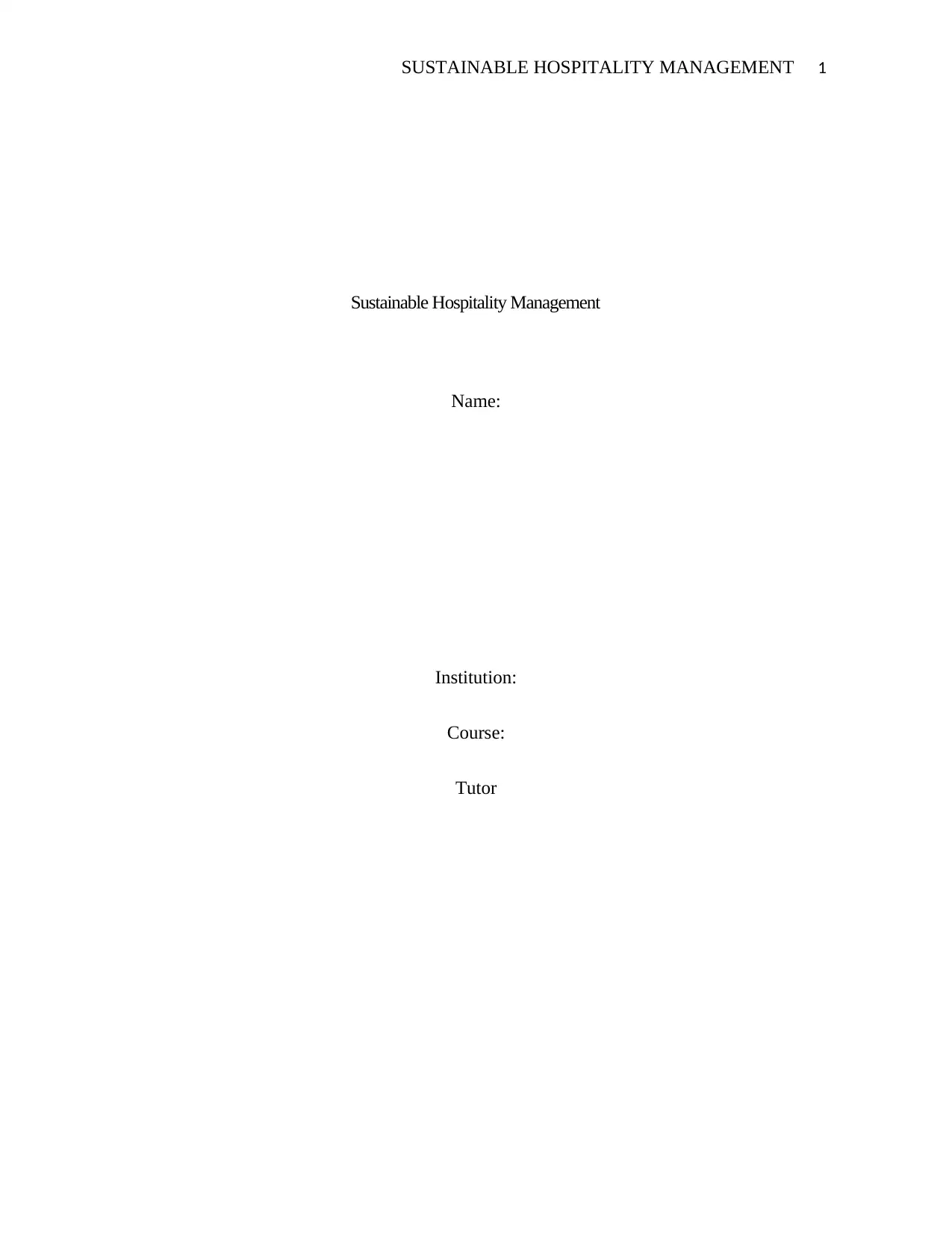
SUSTAINABLE HOSPITALITY MANAGEMENT 1
Sustainable Hospitality Management
Name:
Institution:
Course:
Tutor
Sustainable Hospitality Management
Name:
Institution:
Course:
Tutor
Secure Best Marks with AI Grader
Need help grading? Try our AI Grader for instant feedback on your assignments.
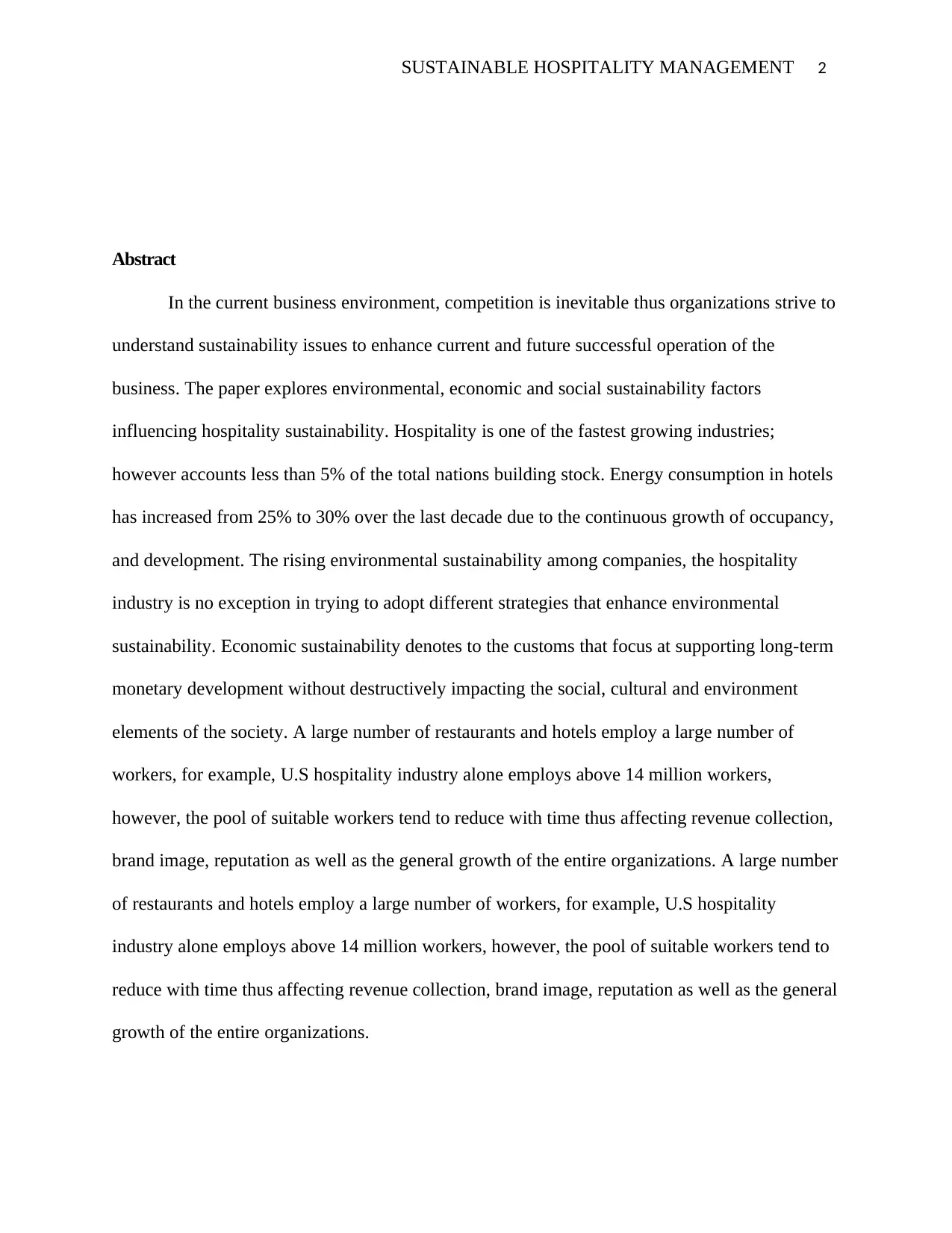
SUSTAINABLE HOSPITALITY MANAGEMENT 2
Abstract
In the current business environment, competition is inevitable thus organizations strive to
understand sustainability issues to enhance current and future successful operation of the
business. The paper explores environmental, economic and social sustainability factors
influencing hospitality sustainability. Hospitality is one of the fastest growing industries;
however accounts less than 5% of the total nations building stock. Energy consumption in hotels
has increased from 25% to 30% over the last decade due to the continuous growth of occupancy,
and development. The rising environmental sustainability among companies, the hospitality
industry is no exception in trying to adopt different strategies that enhance environmental
sustainability. Economic sustainability denotes to the customs that focus at supporting long-term
monetary development without destructively impacting the social, cultural and environment
elements of the society. A large number of restaurants and hotels employ a large number of
workers, for example, U.S hospitality industry alone employs above 14 million workers,
however, the pool of suitable workers tend to reduce with time thus affecting revenue collection,
brand image, reputation as well as the general growth of the entire organizations. A large number
of restaurants and hotels employ a large number of workers, for example, U.S hospitality
industry alone employs above 14 million workers, however, the pool of suitable workers tend to
reduce with time thus affecting revenue collection, brand image, reputation as well as the general
growth of the entire organizations.
Abstract
In the current business environment, competition is inevitable thus organizations strive to
understand sustainability issues to enhance current and future successful operation of the
business. The paper explores environmental, economic and social sustainability factors
influencing hospitality sustainability. Hospitality is one of the fastest growing industries;
however accounts less than 5% of the total nations building stock. Energy consumption in hotels
has increased from 25% to 30% over the last decade due to the continuous growth of occupancy,
and development. The rising environmental sustainability among companies, the hospitality
industry is no exception in trying to adopt different strategies that enhance environmental
sustainability. Economic sustainability denotes to the customs that focus at supporting long-term
monetary development without destructively impacting the social, cultural and environment
elements of the society. A large number of restaurants and hotels employ a large number of
workers, for example, U.S hospitality industry alone employs above 14 million workers,
however, the pool of suitable workers tend to reduce with time thus affecting revenue collection,
brand image, reputation as well as the general growth of the entire organizations. A large number
of restaurants and hotels employ a large number of workers, for example, U.S hospitality
industry alone employs above 14 million workers, however, the pool of suitable workers tend to
reduce with time thus affecting revenue collection, brand image, reputation as well as the general
growth of the entire organizations.
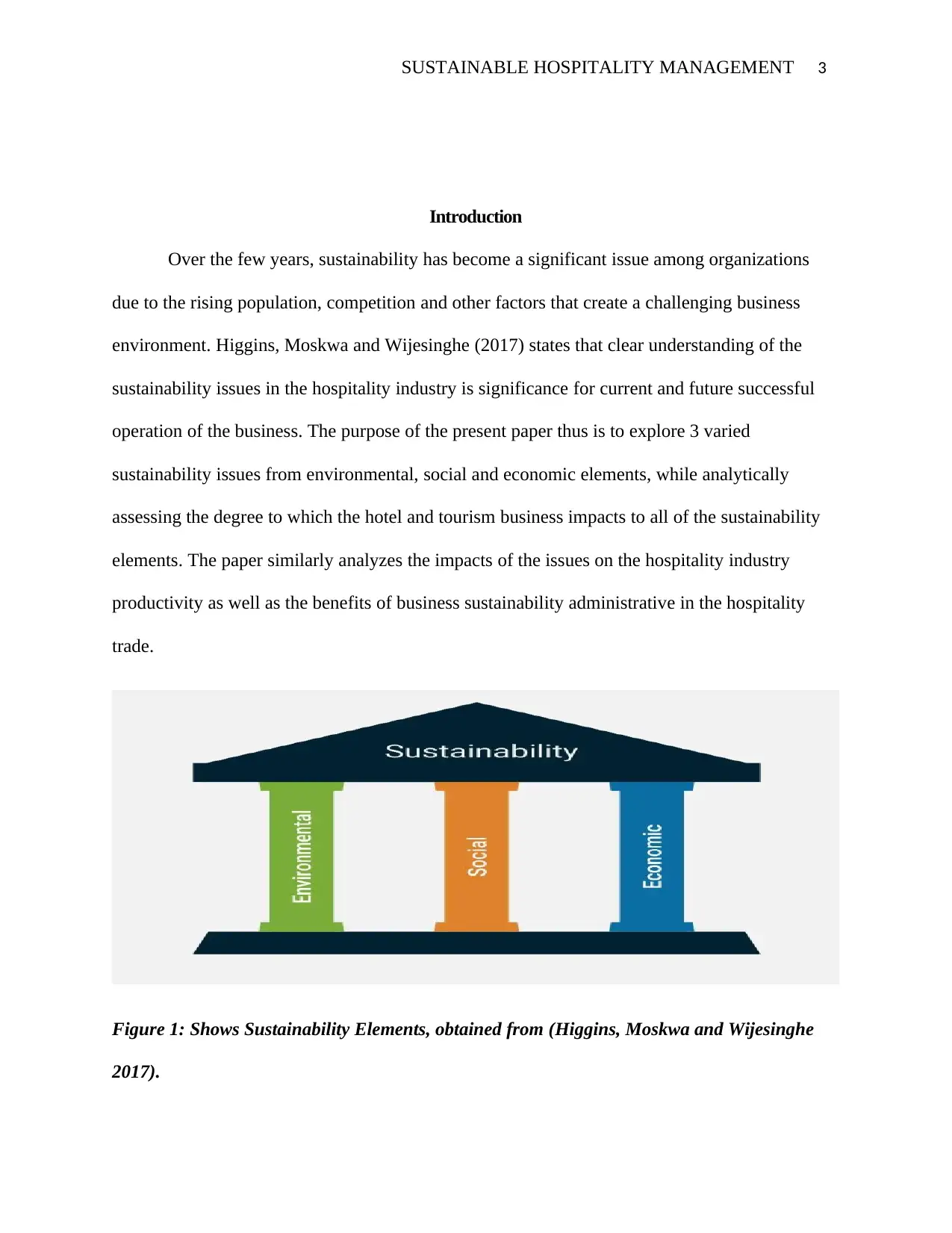
SUSTAINABLE HOSPITALITY MANAGEMENT 3
Introduction
Over the few years, sustainability has become a significant issue among organizations
due to the rising population, competition and other factors that create a challenging business
environment. Higgins, Moskwa and Wijesinghe (2017) states that clear understanding of the
sustainability issues in the hospitality industry is significance for current and future successful
operation of the business. The purpose of the present paper thus is to explore 3 varied
sustainability issues from environmental, social and economic elements, while analytically
assessing the degree to which the hotel and tourism business impacts to all of the sustainability
elements. The paper similarly analyzes the impacts of the issues on the hospitality industry
productivity as well as the benefits of business sustainability administrative in the hospitality
trade.
Figure 1: Shows Sustainability Elements, obtained from (Higgins, Moskwa and Wijesinghe
2017).
Introduction
Over the few years, sustainability has become a significant issue among organizations
due to the rising population, competition and other factors that create a challenging business
environment. Higgins, Moskwa and Wijesinghe (2017) states that clear understanding of the
sustainability issues in the hospitality industry is significance for current and future successful
operation of the business. The purpose of the present paper thus is to explore 3 varied
sustainability issues from environmental, social and economic elements, while analytically
assessing the degree to which the hotel and tourism business impacts to all of the sustainability
elements. The paper similarly analyzes the impacts of the issues on the hospitality industry
productivity as well as the benefits of business sustainability administrative in the hospitality
trade.
Figure 1: Shows Sustainability Elements, obtained from (Higgins, Moskwa and Wijesinghe
2017).
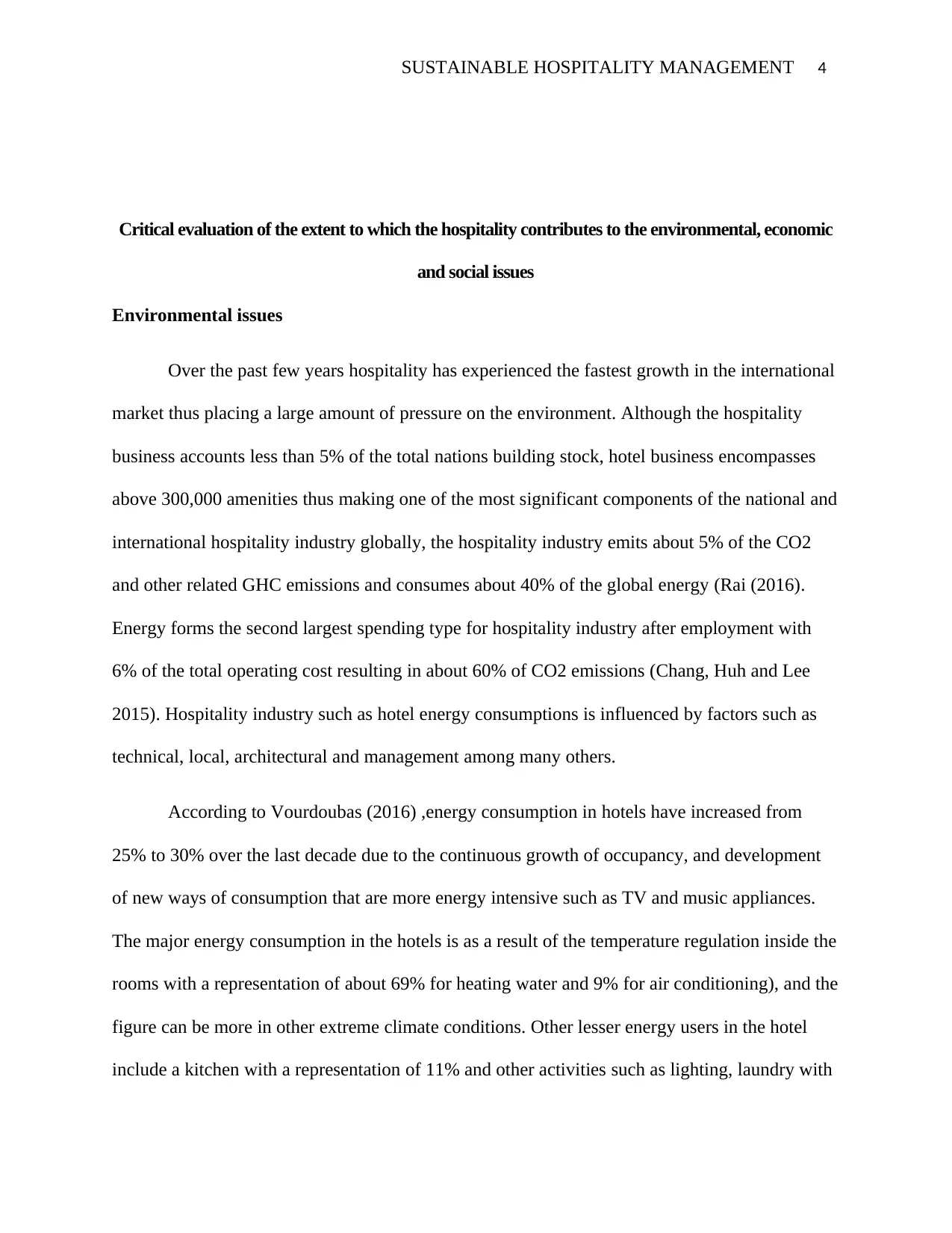
SUSTAINABLE HOSPITALITY MANAGEMENT 4
Critical evaluation of the extent to which the hospitality contributes to the environmental, economic
and social issues
Environmental issues
Over the past few years hospitality has experienced the fastest growth in the international
market thus placing a large amount of pressure on the environment. Although the hospitality
business accounts less than 5% of the total nations building stock, hotel business encompasses
above 300,000 amenities thus making one of the most significant components of the national and
international hospitality industry globally, the hospitality industry emits about 5% of the CO2
and other related GHC emissions and consumes about 40% of the global energy (Rai (2016).
Energy forms the second largest spending type for hospitality industry after employment with
6% of the total operating cost resulting in about 60% of CO2 emissions (Chang, Huh and Lee
2015). Hospitality industry such as hotel energy consumptions is influenced by factors such as
technical, local, architectural and management among many others.
According to Vourdoubas (2016) ,energy consumption in hotels have increased from
25% to 30% over the last decade due to the continuous growth of occupancy, and development
of new ways of consumption that are more energy intensive such as TV and music appliances.
The major energy consumption in the hotels is as a result of the temperature regulation inside the
rooms with a representation of about 69% for heating water and 9% for air conditioning), and the
figure can be more in other extreme climate conditions. Other lesser energy users in the hotel
include a kitchen with a representation of 11% and other activities such as lighting, laundry with
Critical evaluation of the extent to which the hospitality contributes to the environmental, economic
and social issues
Environmental issues
Over the past few years hospitality has experienced the fastest growth in the international
market thus placing a large amount of pressure on the environment. Although the hospitality
business accounts less than 5% of the total nations building stock, hotel business encompasses
above 300,000 amenities thus making one of the most significant components of the national and
international hospitality industry globally, the hospitality industry emits about 5% of the CO2
and other related GHC emissions and consumes about 40% of the global energy (Rai (2016).
Energy forms the second largest spending type for hospitality industry after employment with
6% of the total operating cost resulting in about 60% of CO2 emissions (Chang, Huh and Lee
2015). Hospitality industry such as hotel energy consumptions is influenced by factors such as
technical, local, architectural and management among many others.
According to Vourdoubas (2016) ,energy consumption in hotels have increased from
25% to 30% over the last decade due to the continuous growth of occupancy, and development
of new ways of consumption that are more energy intensive such as TV and music appliances.
The major energy consumption in the hotels is as a result of the temperature regulation inside the
rooms with a representation of about 69% for heating water and 9% for air conditioning), and the
figure can be more in other extreme climate conditions. Other lesser energy users in the hotel
include a kitchen with a representation of 11% and other activities such as lighting, laundry with
Secure Best Marks with AI Grader
Need help grading? Try our AI Grader for instant feedback on your assignments.
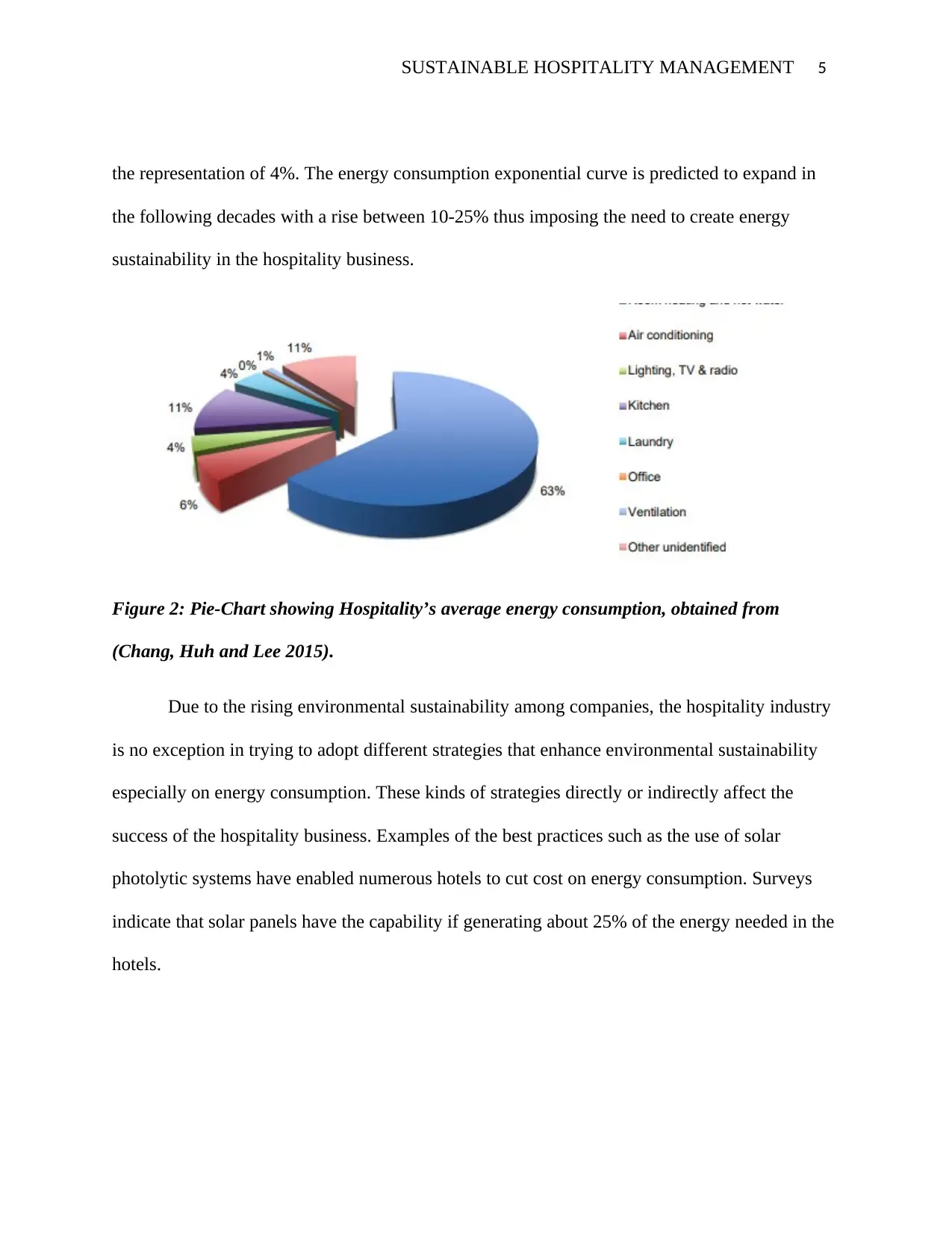
SUSTAINABLE HOSPITALITY MANAGEMENT 5
the representation of 4%. The energy consumption exponential curve is predicted to expand in
the following decades with a rise between 10-25% thus imposing the need to create energy
sustainability in the hospitality business.
Figure 2: Pie-Chart showing Hospitality’s average energy consumption, obtained from
(Chang, Huh and Lee 2015).
Due to the rising environmental sustainability among companies, the hospitality industry
is no exception in trying to adopt different strategies that enhance environmental sustainability
especially on energy consumption. These kinds of strategies directly or indirectly affect the
success of the hospitality business. Examples of the best practices such as the use of solar
photolytic systems have enabled numerous hotels to cut cost on energy consumption. Surveys
indicate that solar panels have the capability if generating about 25% of the energy needed in the
hotels.
the representation of 4%. The energy consumption exponential curve is predicted to expand in
the following decades with a rise between 10-25% thus imposing the need to create energy
sustainability in the hospitality business.
Figure 2: Pie-Chart showing Hospitality’s average energy consumption, obtained from
(Chang, Huh and Lee 2015).
Due to the rising environmental sustainability among companies, the hospitality industry
is no exception in trying to adopt different strategies that enhance environmental sustainability
especially on energy consumption. These kinds of strategies directly or indirectly affect the
success of the hospitality business. Examples of the best practices such as the use of solar
photolytic systems have enabled numerous hotels to cut cost on energy consumption. Surveys
indicate that solar panels have the capability if generating about 25% of the energy needed in the
hotels.
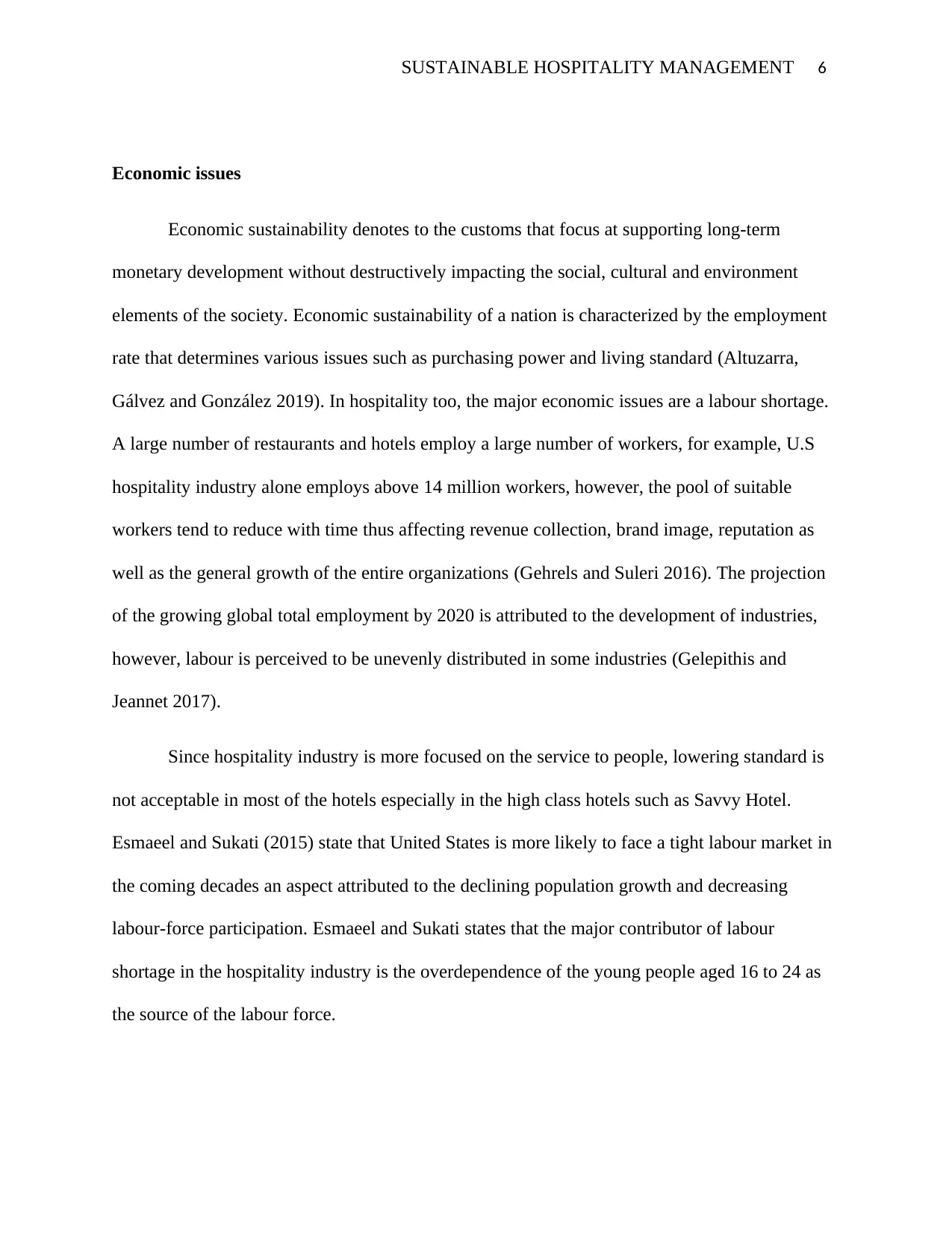
SUSTAINABLE HOSPITALITY MANAGEMENT 6
Economic issues
Economic sustainability denotes to the customs that focus at supporting long-term
monetary development without destructively impacting the social, cultural and environment
elements of the society. Economic sustainability of a nation is characterized by the employment
rate that determines various issues such as purchasing power and living standard (Altuzarra,
Gálvez and González 2019). In hospitality too, the major economic issues are a labour shortage.
A large number of restaurants and hotels employ a large number of workers, for example, U.S
hospitality industry alone employs above 14 million workers, however, the pool of suitable
workers tend to reduce with time thus affecting revenue collection, brand image, reputation as
well as the general growth of the entire organizations (Gehrels and Suleri 2016). The projection
of the growing global total employment by 2020 is attributed to the development of industries,
however, labour is perceived to be unevenly distributed in some industries (Gelepithis and
Jeannet 2017).
Since hospitality industry is more focused on the service to people, lowering standard is
not acceptable in most of the hotels especially in the high class hotels such as Savvy Hotel.
Esmaeel and Sukati (2015) state that United States is more likely to face a tight labour market in
the coming decades an aspect attributed to the declining population growth and decreasing
labour-force participation. Esmaeel and Sukati states that the major contributor of labour
shortage in the hospitality industry is the overdependence of the young people aged 16 to 24 as
the source of the labour force.
Economic issues
Economic sustainability denotes to the customs that focus at supporting long-term
monetary development without destructively impacting the social, cultural and environment
elements of the society. Economic sustainability of a nation is characterized by the employment
rate that determines various issues such as purchasing power and living standard (Altuzarra,
Gálvez and González 2019). In hospitality too, the major economic issues are a labour shortage.
A large number of restaurants and hotels employ a large number of workers, for example, U.S
hospitality industry alone employs above 14 million workers, however, the pool of suitable
workers tend to reduce with time thus affecting revenue collection, brand image, reputation as
well as the general growth of the entire organizations (Gehrels and Suleri 2016). The projection
of the growing global total employment by 2020 is attributed to the development of industries,
however, labour is perceived to be unevenly distributed in some industries (Gelepithis and
Jeannet 2017).
Since hospitality industry is more focused on the service to people, lowering standard is
not acceptable in most of the hotels especially in the high class hotels such as Savvy Hotel.
Esmaeel and Sukati (2015) state that United States is more likely to face a tight labour market in
the coming decades an aspect attributed to the declining population growth and decreasing
labour-force participation. Esmaeel and Sukati states that the major contributor of labour
shortage in the hospitality industry is the overdependence of the young people aged 16 to 24 as
the source of the labour force.
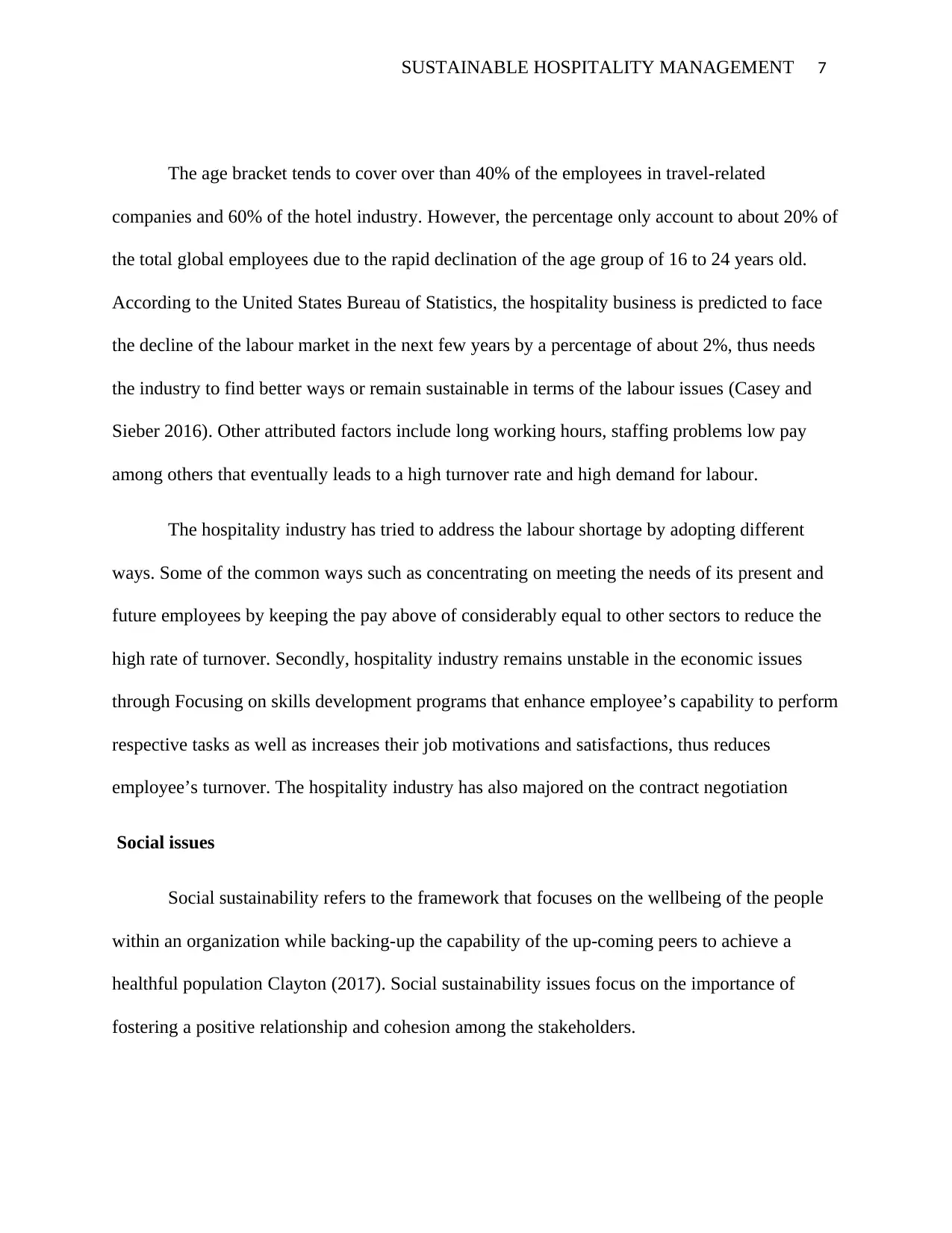
SUSTAINABLE HOSPITALITY MANAGEMENT 7
The age bracket tends to cover over than 40% of the employees in travel-related
companies and 60% of the hotel industry. However, the percentage only account to about 20% of
the total global employees due to the rapid declination of the age group of 16 to 24 years old.
According to the United States Bureau of Statistics, the hospitality business is predicted to face
the decline of the labour market in the next few years by a percentage of about 2%, thus needs
the industry to find better ways or remain sustainable in terms of the labour issues (Casey and
Sieber 2016). Other attributed factors include long working hours, staffing problems low pay
among others that eventually leads to a high turnover rate and high demand for labour.
The hospitality industry has tried to address the labour shortage by adopting different
ways. Some of the common ways such as concentrating on meeting the needs of its present and
future employees by keeping the pay above of considerably equal to other sectors to reduce the
high rate of turnover. Secondly, hospitality industry remains unstable in the economic issues
through Focusing on skills development programs that enhance employee’s capability to perform
respective tasks as well as increases their job motivations and satisfactions, thus reduces
employee’s turnover. The hospitality industry has also majored on the contract negotiation
Social issues
Social sustainability refers to the framework that focuses on the wellbeing of the people
within an organization while backing-up the capability of the up-coming peers to achieve a
healthful population Clayton (2017). Social sustainability issues focus on the importance of
fostering a positive relationship and cohesion among the stakeholders.
The age bracket tends to cover over than 40% of the employees in travel-related
companies and 60% of the hotel industry. However, the percentage only account to about 20% of
the total global employees due to the rapid declination of the age group of 16 to 24 years old.
According to the United States Bureau of Statistics, the hospitality business is predicted to face
the decline of the labour market in the next few years by a percentage of about 2%, thus needs
the industry to find better ways or remain sustainable in terms of the labour issues (Casey and
Sieber 2016). Other attributed factors include long working hours, staffing problems low pay
among others that eventually leads to a high turnover rate and high demand for labour.
The hospitality industry has tried to address the labour shortage by adopting different
ways. Some of the common ways such as concentrating on meeting the needs of its present and
future employees by keeping the pay above of considerably equal to other sectors to reduce the
high rate of turnover. Secondly, hospitality industry remains unstable in the economic issues
through Focusing on skills development programs that enhance employee’s capability to perform
respective tasks as well as increases their job motivations and satisfactions, thus reduces
employee’s turnover. The hospitality industry has also majored on the contract negotiation
Social issues
Social sustainability refers to the framework that focuses on the wellbeing of the people
within an organization while backing-up the capability of the up-coming peers to achieve a
healthful population Clayton (2017). Social sustainability issues focus on the importance of
fostering a positive relationship and cohesion among the stakeholders.
Paraphrase This Document
Need a fresh take? Get an instant paraphrase of this document with our AI Paraphraser
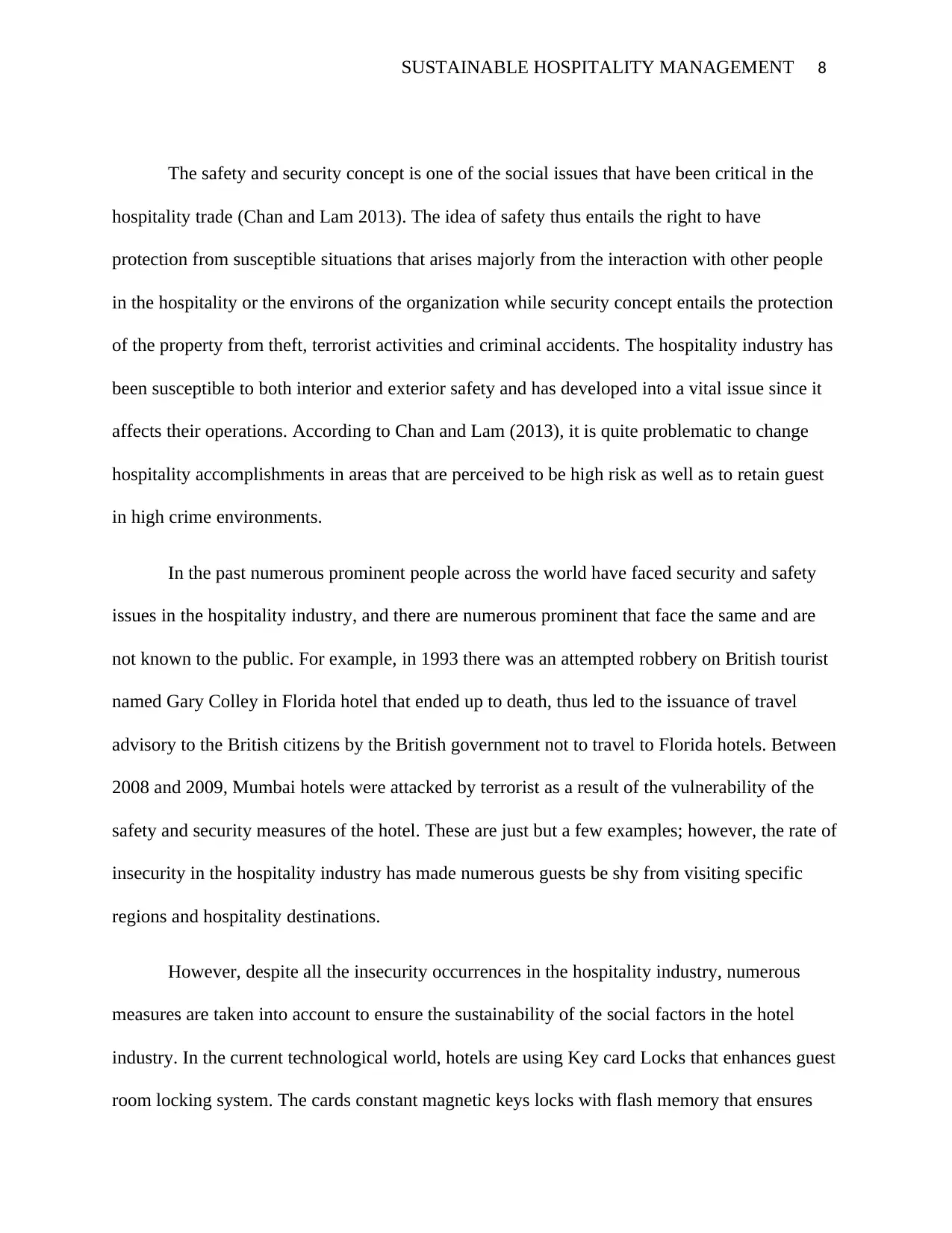
SUSTAINABLE HOSPITALITY MANAGEMENT 8
The safety and security concept is one of the social issues that have been critical in the
hospitality trade (Chan and Lam 2013). The idea of safety thus entails the right to have
protection from susceptible situations that arises majorly from the interaction with other people
in the hospitality or the environs of the organization while security concept entails the protection
of the property from theft, terrorist activities and criminal accidents. The hospitality industry has
been susceptible to both interior and exterior safety and has developed into a vital issue since it
affects their operations. According to Chan and Lam (2013), it is quite problematic to change
hospitality accomplishments in areas that are perceived to be high risk as well as to retain guest
in high crime environments.
In the past numerous prominent people across the world have faced security and safety
issues in the hospitality industry, and there are numerous prominent that face the same and are
not known to the public. For example, in 1993 there was an attempted robbery on British tourist
named Gary Colley in Florida hotel that ended up to death, thus led to the issuance of travel
advisory to the British citizens by the British government not to travel to Florida hotels. Between
2008 and 2009, Mumbai hotels were attacked by terrorist as a result of the vulnerability of the
safety and security measures of the hotel. These are just but a few examples; however, the rate of
insecurity in the hospitality industry has made numerous guests be shy from visiting specific
regions and hospitality destinations.
However, despite all the insecurity occurrences in the hospitality industry, numerous
measures are taken into account to ensure the sustainability of the social factors in the hotel
industry. In the current technological world, hotels are using Key card Locks that enhances guest
room locking system. The cards constant magnetic keys locks with flash memory that ensures
The safety and security concept is one of the social issues that have been critical in the
hospitality trade (Chan and Lam 2013). The idea of safety thus entails the right to have
protection from susceptible situations that arises majorly from the interaction with other people
in the hospitality or the environs of the organization while security concept entails the protection
of the property from theft, terrorist activities and criminal accidents. The hospitality industry has
been susceptible to both interior and exterior safety and has developed into a vital issue since it
affects their operations. According to Chan and Lam (2013), it is quite problematic to change
hospitality accomplishments in areas that are perceived to be high risk as well as to retain guest
in high crime environments.
In the past numerous prominent people across the world have faced security and safety
issues in the hospitality industry, and there are numerous prominent that face the same and are
not known to the public. For example, in 1993 there was an attempted robbery on British tourist
named Gary Colley in Florida hotel that ended up to death, thus led to the issuance of travel
advisory to the British citizens by the British government not to travel to Florida hotels. Between
2008 and 2009, Mumbai hotels were attacked by terrorist as a result of the vulnerability of the
safety and security measures of the hotel. These are just but a few examples; however, the rate of
insecurity in the hospitality industry has made numerous guests be shy from visiting specific
regions and hospitality destinations.
However, despite all the insecurity occurrences in the hospitality industry, numerous
measures are taken into account to ensure the sustainability of the social factors in the hotel
industry. In the current technological world, hotels are using Key card Locks that enhances guest
room locking system. The cards constant magnetic keys locks with flash memory that ensures
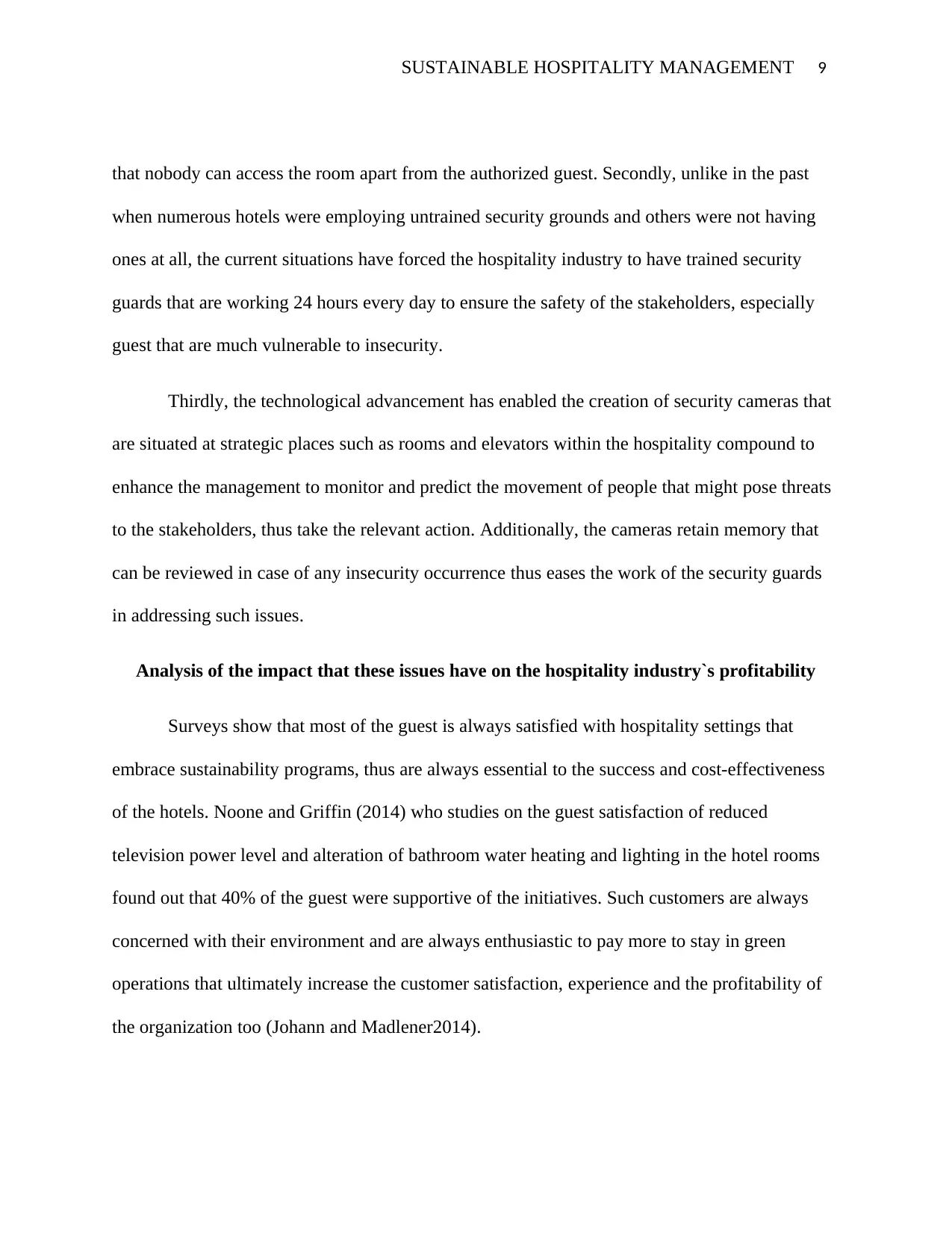
SUSTAINABLE HOSPITALITY MANAGEMENT 9
that nobody can access the room apart from the authorized guest. Secondly, unlike in the past
when numerous hotels were employing untrained security grounds and others were not having
ones at all, the current situations have forced the hospitality industry to have trained security
guards that are working 24 hours every day to ensure the safety of the stakeholders, especially
guest that are much vulnerable to insecurity.
Thirdly, the technological advancement has enabled the creation of security cameras that
are situated at strategic places such as rooms and elevators within the hospitality compound to
enhance the management to monitor and predict the movement of people that might pose threats
to the stakeholders, thus take the relevant action. Additionally, the cameras retain memory that
can be reviewed in case of any insecurity occurrence thus eases the work of the security guards
in addressing such issues.
Analysis of the impact that these issues have on the hospitality industry`s profitability
Surveys show that most of the guest is always satisfied with hospitality settings that
embrace sustainability programs, thus are always essential to the success and cost-effectiveness
of the hotels. Noone and Griffin (2014) who studies on the guest satisfaction of reduced
television power level and alteration of bathroom water heating and lighting in the hotel rooms
found out that 40% of the guest were supportive of the initiatives. Such customers are always
concerned with their environment and are always enthusiastic to pay more to stay in green
operations that ultimately increase the customer satisfaction, experience and the profitability of
the organization too (Johann and Madlener2014).
that nobody can access the room apart from the authorized guest. Secondly, unlike in the past
when numerous hotels were employing untrained security grounds and others were not having
ones at all, the current situations have forced the hospitality industry to have trained security
guards that are working 24 hours every day to ensure the safety of the stakeholders, especially
guest that are much vulnerable to insecurity.
Thirdly, the technological advancement has enabled the creation of security cameras that
are situated at strategic places such as rooms and elevators within the hospitality compound to
enhance the management to monitor and predict the movement of people that might pose threats
to the stakeholders, thus take the relevant action. Additionally, the cameras retain memory that
can be reviewed in case of any insecurity occurrence thus eases the work of the security guards
in addressing such issues.
Analysis of the impact that these issues have on the hospitality industry`s profitability
Surveys show that most of the guest is always satisfied with hospitality settings that
embrace sustainability programs, thus are always essential to the success and cost-effectiveness
of the hotels. Noone and Griffin (2014) who studies on the guest satisfaction of reduced
television power level and alteration of bathroom water heating and lighting in the hotel rooms
found out that 40% of the guest were supportive of the initiatives. Such customers are always
concerned with their environment and are always enthusiastic to pay more to stay in green
operations that ultimately increase the customer satisfaction, experience and the profitability of
the organization too (Johann and Madlener2014).
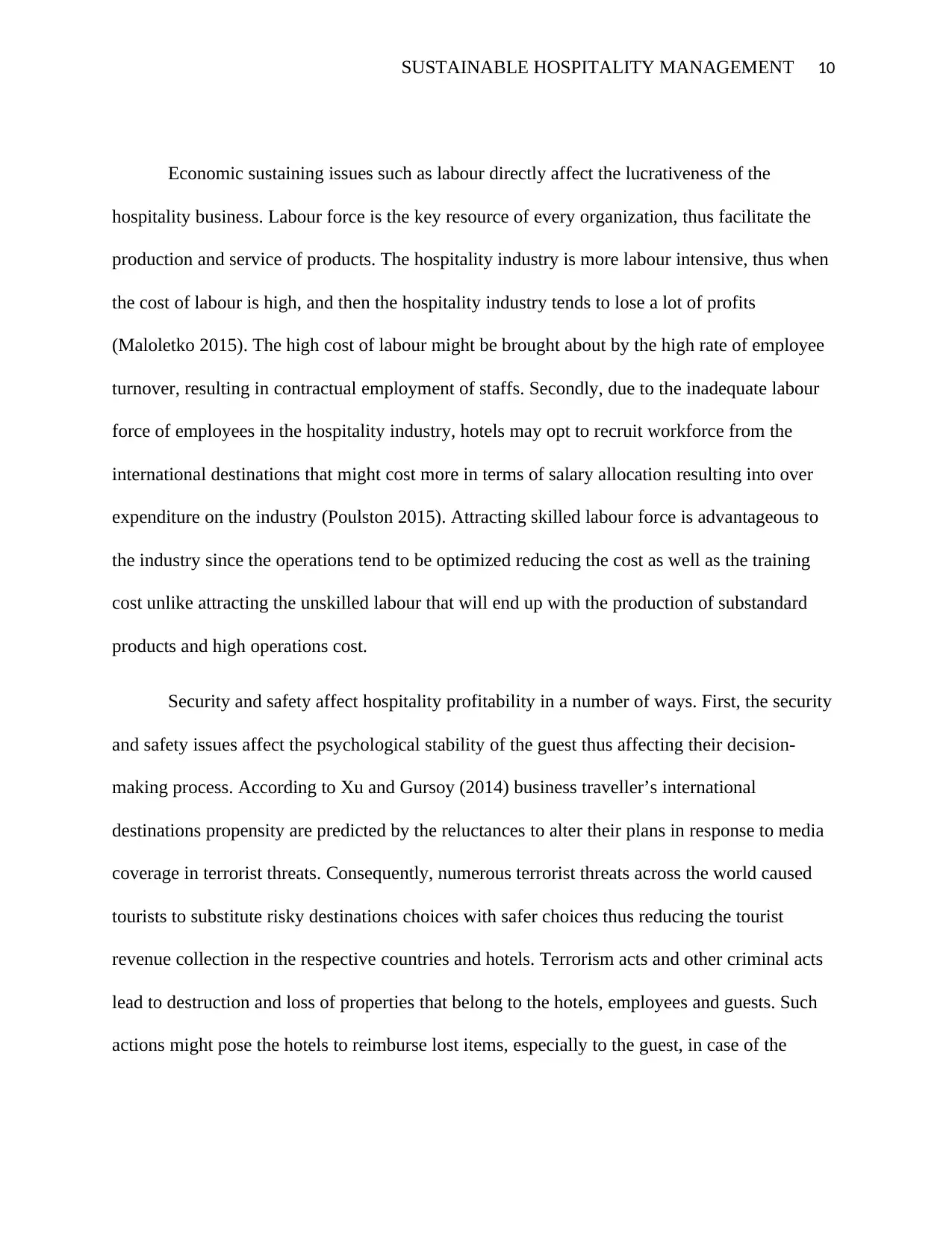
SUSTAINABLE HOSPITALITY MANAGEMENT 10
Economic sustaining issues such as labour directly affect the lucrativeness of the
hospitality business. Labour force is the key resource of every organization, thus facilitate the
production and service of products. The hospitality industry is more labour intensive, thus when
the cost of labour is high, and then the hospitality industry tends to lose a lot of profits
(Maloletko 2015). The high cost of labour might be brought about by the high rate of employee
turnover, resulting in contractual employment of staffs. Secondly, due to the inadequate labour
force of employees in the hospitality industry, hotels may opt to recruit workforce from the
international destinations that might cost more in terms of salary allocation resulting into over
expenditure on the industry (Poulston 2015). Attracting skilled labour force is advantageous to
the industry since the operations tend to be optimized reducing the cost as well as the training
cost unlike attracting the unskilled labour that will end up with the production of substandard
products and high operations cost.
Security and safety affect hospitality profitability in a number of ways. First, the security
and safety issues affect the psychological stability of the guest thus affecting their decision-
making process. According to Xu and Gursoy (2014) business traveller’s international
destinations propensity are predicted by the reluctances to alter their plans in response to media
coverage in terrorist threats. Consequently, numerous terrorist threats across the world caused
tourists to substitute risky destinations choices with safer choices thus reducing the tourist
revenue collection in the respective countries and hotels. Terrorism acts and other criminal acts
lead to destruction and loss of properties that belong to the hotels, employees and guests. Such
actions might pose the hotels to reimburse lost items, especially to the guest, in case of the
Economic sustaining issues such as labour directly affect the lucrativeness of the
hospitality business. Labour force is the key resource of every organization, thus facilitate the
production and service of products. The hospitality industry is more labour intensive, thus when
the cost of labour is high, and then the hospitality industry tends to lose a lot of profits
(Maloletko 2015). The high cost of labour might be brought about by the high rate of employee
turnover, resulting in contractual employment of staffs. Secondly, due to the inadequate labour
force of employees in the hospitality industry, hotels may opt to recruit workforce from the
international destinations that might cost more in terms of salary allocation resulting into over
expenditure on the industry (Poulston 2015). Attracting skilled labour force is advantageous to
the industry since the operations tend to be optimized reducing the cost as well as the training
cost unlike attracting the unskilled labour that will end up with the production of substandard
products and high operations cost.
Security and safety affect hospitality profitability in a number of ways. First, the security
and safety issues affect the psychological stability of the guest thus affecting their decision-
making process. According to Xu and Gursoy (2014) business traveller’s international
destinations propensity are predicted by the reluctances to alter their plans in response to media
coverage in terrorist threats. Consequently, numerous terrorist threats across the world caused
tourists to substitute risky destinations choices with safer choices thus reducing the tourist
revenue collection in the respective countries and hotels. Terrorism acts and other criminal acts
lead to destruction and loss of properties that belong to the hotels, employees and guests. Such
actions might pose the hotels to reimburse lost items, especially to the guest, in case of the
Secure Best Marks with AI Grader
Need help grading? Try our AI Grader for instant feedback on your assignments.
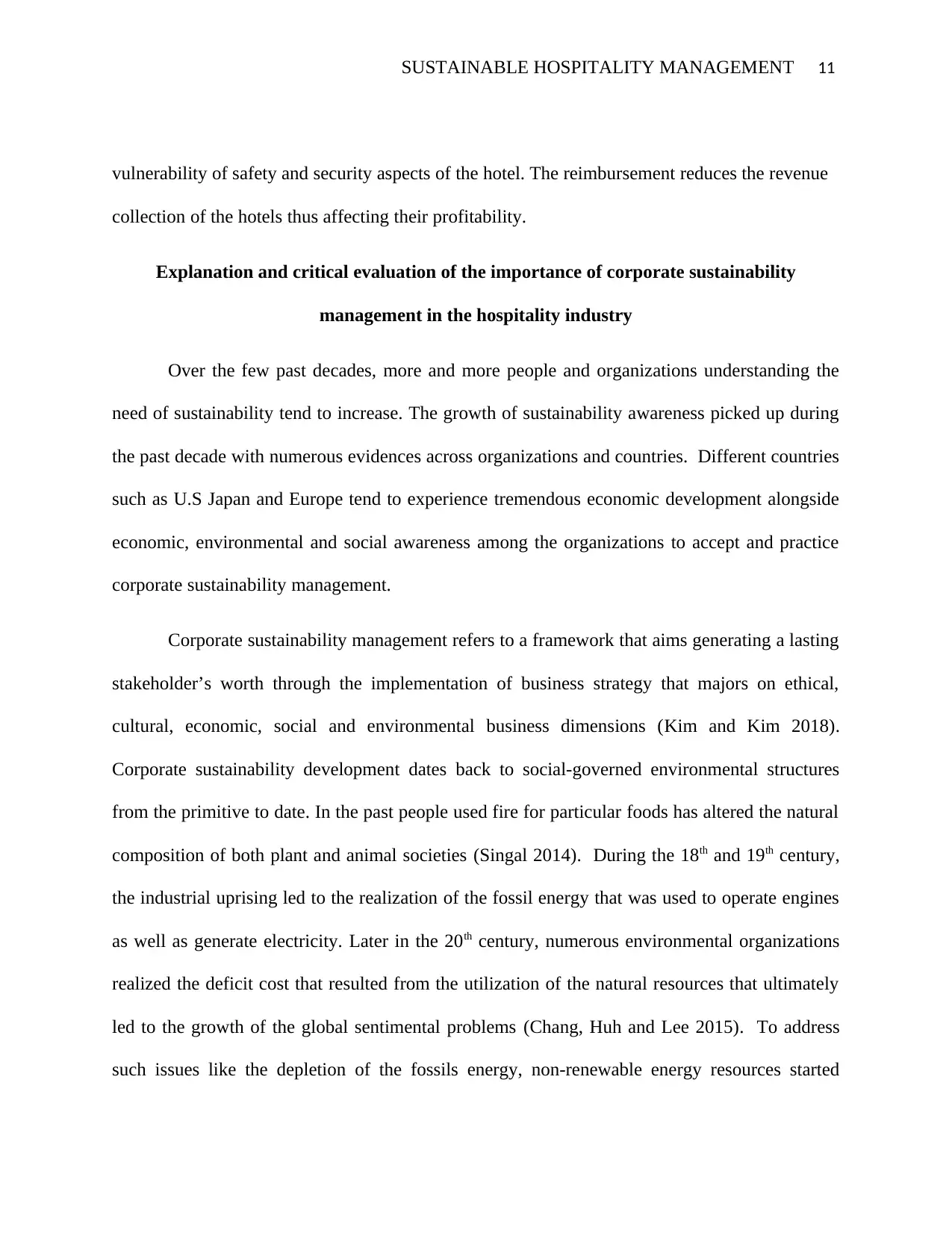
SUSTAINABLE HOSPITALITY MANAGEMENT 11
vulnerability of safety and security aspects of the hotel. The reimbursement reduces the revenue
collection of the hotels thus affecting their profitability.
Explanation and critical evaluation of the importance of corporate sustainability
management in the hospitality industry
Over the few past decades, more and more people and organizations understanding the
need of sustainability tend to increase. The growth of sustainability awareness picked up during
the past decade with numerous evidences across organizations and countries. Different countries
such as U.S Japan and Europe tend to experience tremendous economic development alongside
economic, environmental and social awareness among the organizations to accept and practice
corporate sustainability management.
Corporate sustainability management refers to a framework that aims generating a lasting
stakeholder’s worth through the implementation of business strategy that majors on ethical,
cultural, economic, social and environmental business dimensions (Kim and Kim 2018).
Corporate sustainability development dates back to social-governed environmental structures
from the primitive to date. In the past people used fire for particular foods has altered the natural
composition of both plant and animal societies (Singal 2014). During the 18th and 19th century,
the industrial uprising led to the realization of the fossil energy that was used to operate engines
as well as generate electricity. Later in the 20th century, numerous environmental organizations
realized the deficit cost that resulted from the utilization of the natural resources that ultimately
led to the growth of the global sentimental problems (Chang, Huh and Lee 2015). To address
such issues like the depletion of the fossils energy, non-renewable energy resources started
vulnerability of safety and security aspects of the hotel. The reimbursement reduces the revenue
collection of the hotels thus affecting their profitability.
Explanation and critical evaluation of the importance of corporate sustainability
management in the hospitality industry
Over the few past decades, more and more people and organizations understanding the
need of sustainability tend to increase. The growth of sustainability awareness picked up during
the past decade with numerous evidences across organizations and countries. Different countries
such as U.S Japan and Europe tend to experience tremendous economic development alongside
economic, environmental and social awareness among the organizations to accept and practice
corporate sustainability management.
Corporate sustainability management refers to a framework that aims generating a lasting
stakeholder’s worth through the implementation of business strategy that majors on ethical,
cultural, economic, social and environmental business dimensions (Kim and Kim 2018).
Corporate sustainability development dates back to social-governed environmental structures
from the primitive to date. In the past people used fire for particular foods has altered the natural
composition of both plant and animal societies (Singal 2014). During the 18th and 19th century,
the industrial uprising led to the realization of the fossil energy that was used to operate engines
as well as generate electricity. Later in the 20th century, numerous environmental organizations
realized the deficit cost that resulted from the utilization of the natural resources that ultimately
led to the growth of the global sentimental problems (Chang, Huh and Lee 2015). To address
such issues like the depletion of the fossils energy, non-renewable energy resources started
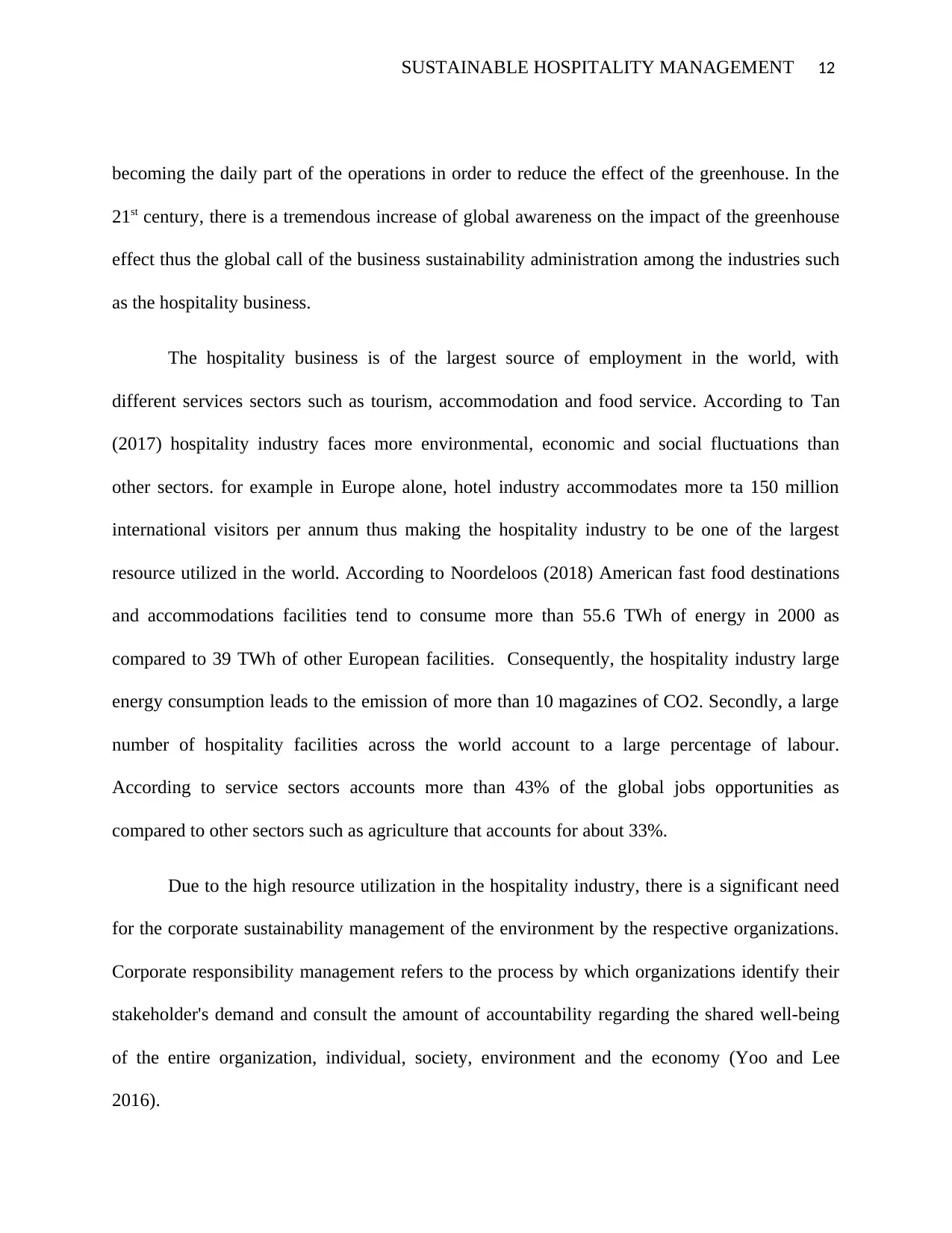
SUSTAINABLE HOSPITALITY MANAGEMENT 12
becoming the daily part of the operations in order to reduce the effect of the greenhouse. In the
21st century, there is a tremendous increase of global awareness on the impact of the greenhouse
effect thus the global call of the business sustainability administration among the industries such
as the hospitality business.
The hospitality business is of the largest source of employment in the world, with
different services sectors such as tourism, accommodation and food service. According to Tan
(2017) hospitality industry faces more environmental, economic and social fluctuations than
other sectors. for example in Europe alone, hotel industry accommodates more ta 150 million
international visitors per annum thus making the hospitality industry to be one of the largest
resource utilized in the world. According to Noordeloos (2018) American fast food destinations
and accommodations facilities tend to consume more than 55.6 TWh of energy in 2000 as
compared to 39 TWh of other European facilities. Consequently, the hospitality industry large
energy consumption leads to the emission of more than 10 magazines of CO2. Secondly, a large
number of hospitality facilities across the world account to a large percentage of labour.
According to service sectors accounts more than 43% of the global jobs opportunities as
compared to other sectors such as agriculture that accounts for about 33%.
Due to the high resource utilization in the hospitality industry, there is a significant need
for the corporate sustainability management of the environment by the respective organizations.
Corporate responsibility management refers to the process by which organizations identify their
stakeholder's demand and consult the amount of accountability regarding the shared well-being
of the entire organization, individual, society, environment and the economy (Yoo and Lee
2016).
becoming the daily part of the operations in order to reduce the effect of the greenhouse. In the
21st century, there is a tremendous increase of global awareness on the impact of the greenhouse
effect thus the global call of the business sustainability administration among the industries such
as the hospitality business.
The hospitality business is of the largest source of employment in the world, with
different services sectors such as tourism, accommodation and food service. According to Tan
(2017) hospitality industry faces more environmental, economic and social fluctuations than
other sectors. for example in Europe alone, hotel industry accommodates more ta 150 million
international visitors per annum thus making the hospitality industry to be one of the largest
resource utilized in the world. According to Noordeloos (2018) American fast food destinations
and accommodations facilities tend to consume more than 55.6 TWh of energy in 2000 as
compared to 39 TWh of other European facilities. Consequently, the hospitality industry large
energy consumption leads to the emission of more than 10 magazines of CO2. Secondly, a large
number of hospitality facilities across the world account to a large percentage of labour.
According to service sectors accounts more than 43% of the global jobs opportunities as
compared to other sectors such as agriculture that accounts for about 33%.
Due to the high resource utilization in the hospitality industry, there is a significant need
for the corporate sustainability management of the environment by the respective organizations.
Corporate responsibility management refers to the process by which organizations identify their
stakeholder's demand and consult the amount of accountability regarding the shared well-being
of the entire organization, individual, society, environment and the economy (Yoo and Lee
2016).
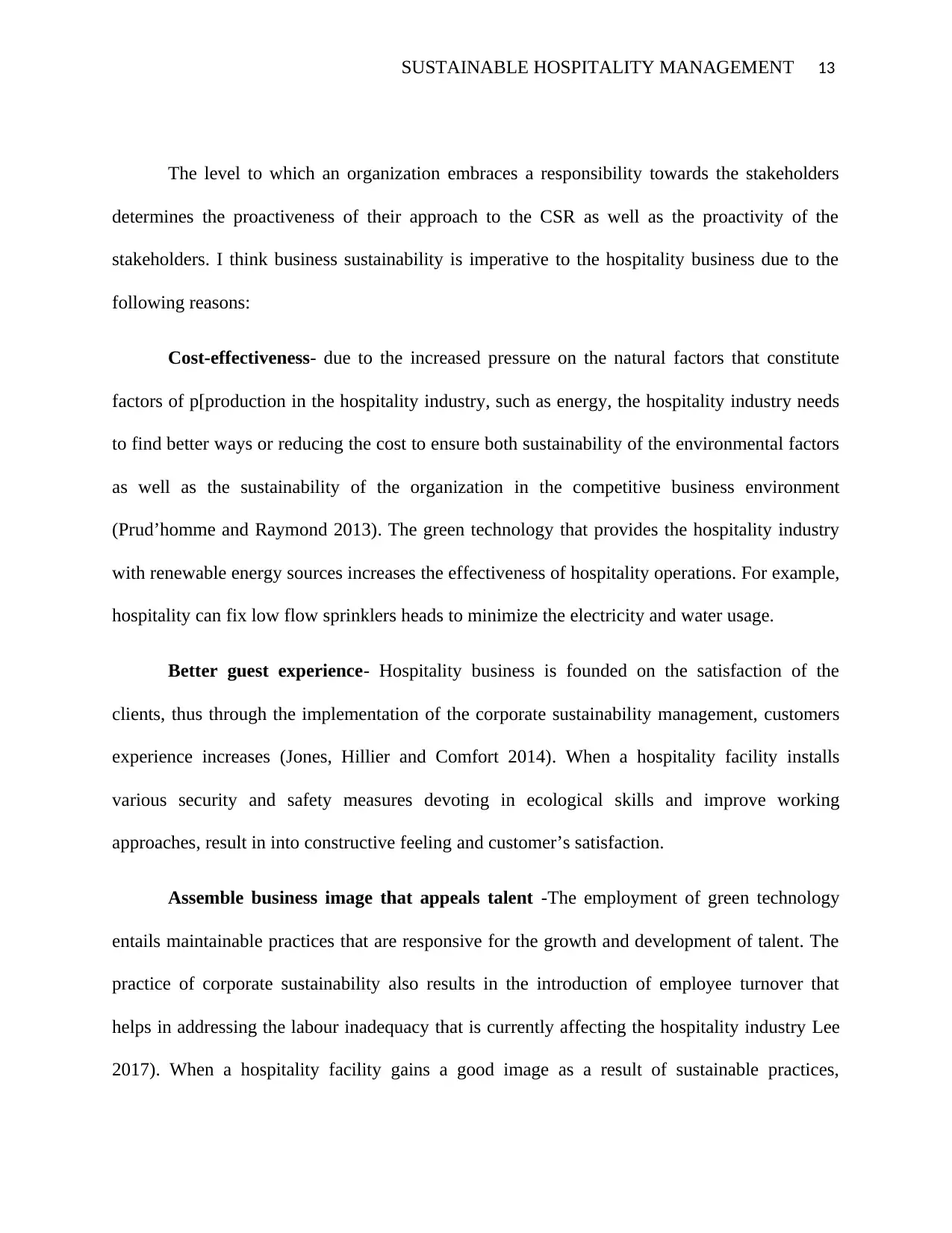
SUSTAINABLE HOSPITALITY MANAGEMENT 13
The level to which an organization embraces a responsibility towards the stakeholders
determines the proactiveness of their approach to the CSR as well as the proactivity of the
stakeholders. I think business sustainability is imperative to the hospitality business due to the
following reasons:
Cost-effectiveness- due to the increased pressure on the natural factors that constitute
factors of p[production in the hospitality industry, such as energy, the hospitality industry needs
to find better ways or reducing the cost to ensure both sustainability of the environmental factors
as well as the sustainability of the organization in the competitive business environment
(Prud’homme and Raymond 2013). The green technology that provides the hospitality industry
with renewable energy sources increases the effectiveness of hospitality operations. For example,
hospitality can fix low flow sprinklers heads to minimize the electricity and water usage.
Better guest experience- Hospitality business is founded on the satisfaction of the
clients, thus through the implementation of the corporate sustainability management, customers
experience increases (Jones, Hillier and Comfort 2014). When a hospitality facility installs
various security and safety measures devoting in ecological skills and improve working
approaches, result in into constructive feeling and customer’s satisfaction.
Assemble business image that appeals talent -The employment of green technology
entails maintainable practices that are responsive for the growth and development of talent. The
practice of corporate sustainability also results in the introduction of employee turnover that
helps in addressing the labour inadequacy that is currently affecting the hospitality industry Lee
2017). When a hospitality facility gains a good image as a result of sustainable practices,
The level to which an organization embraces a responsibility towards the stakeholders
determines the proactiveness of their approach to the CSR as well as the proactivity of the
stakeholders. I think business sustainability is imperative to the hospitality business due to the
following reasons:
Cost-effectiveness- due to the increased pressure on the natural factors that constitute
factors of p[production in the hospitality industry, such as energy, the hospitality industry needs
to find better ways or reducing the cost to ensure both sustainability of the environmental factors
as well as the sustainability of the organization in the competitive business environment
(Prud’homme and Raymond 2013). The green technology that provides the hospitality industry
with renewable energy sources increases the effectiveness of hospitality operations. For example,
hospitality can fix low flow sprinklers heads to minimize the electricity and water usage.
Better guest experience- Hospitality business is founded on the satisfaction of the
clients, thus through the implementation of the corporate sustainability management, customers
experience increases (Jones, Hillier and Comfort 2014). When a hospitality facility installs
various security and safety measures devoting in ecological skills and improve working
approaches, result in into constructive feeling and customer’s satisfaction.
Assemble business image that appeals talent -The employment of green technology
entails maintainable practices that are responsive for the growth and development of talent. The
practice of corporate sustainability also results in the introduction of employee turnover that
helps in addressing the labour inadequacy that is currently affecting the hospitality industry Lee
2017). When a hospitality facility gains a good image as a result of sustainable practices,
Paraphrase This Document
Need a fresh take? Get an instant paraphrase of this document with our AI Paraphraser
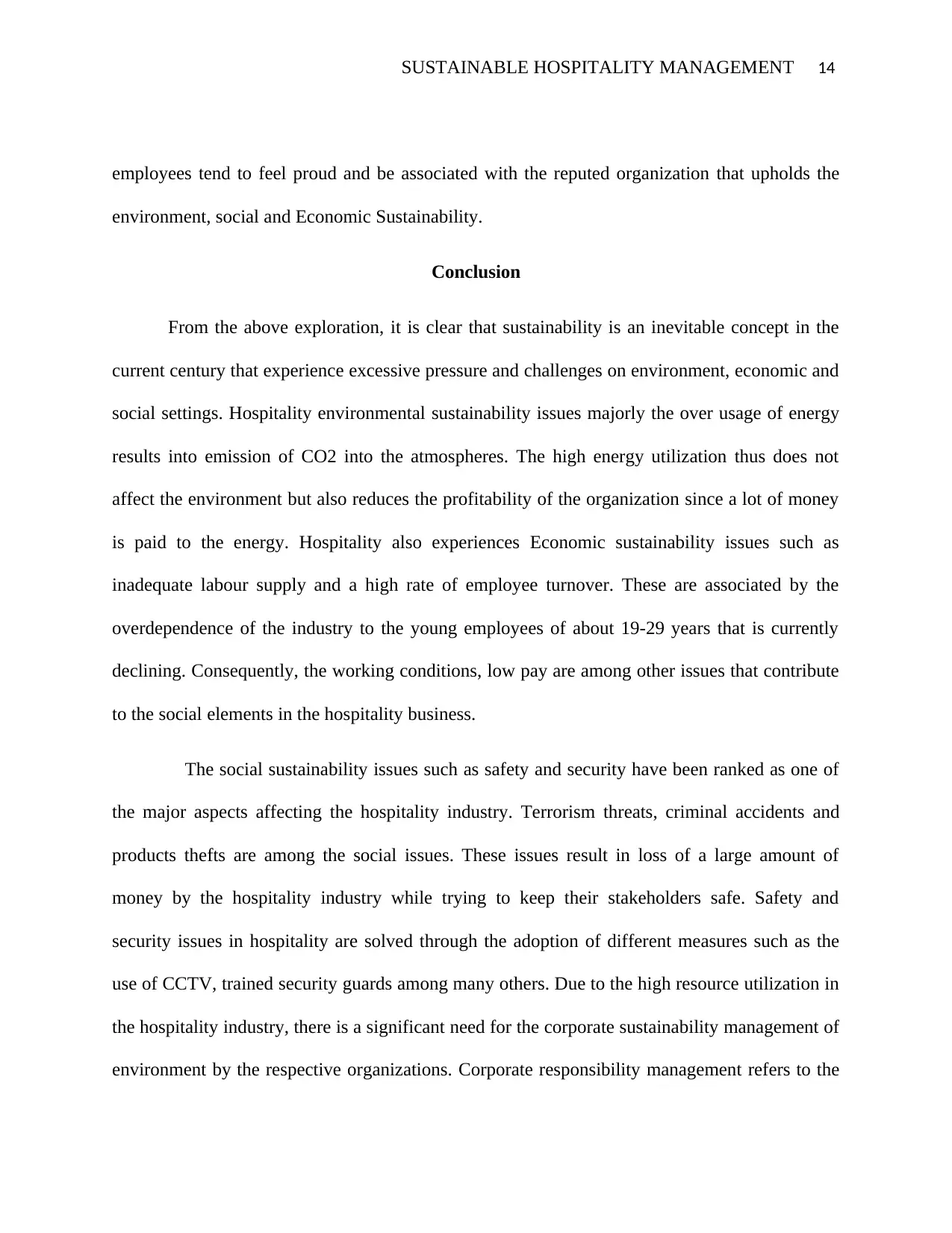
SUSTAINABLE HOSPITALITY MANAGEMENT 14
employees tend to feel proud and be associated with the reputed organization that upholds the
environment, social and Economic Sustainability.
Conclusion
From the above exploration, it is clear that sustainability is an inevitable concept in the
current century that experience excessive pressure and challenges on environment, economic and
social settings. Hospitality environmental sustainability issues majorly the over usage of energy
results into emission of CO2 into the atmospheres. The high energy utilization thus does not
affect the environment but also reduces the profitability of the organization since a lot of money
is paid to the energy. Hospitality also experiences Economic sustainability issues such as
inadequate labour supply and a high rate of employee turnover. These are associated by the
overdependence of the industry to the young employees of about 19-29 years that is currently
declining. Consequently, the working conditions, low pay are among other issues that contribute
to the social elements in the hospitality business.
The social sustainability issues such as safety and security have been ranked as one of
the major aspects affecting the hospitality industry. Terrorism threats, criminal accidents and
products thefts are among the social issues. These issues result in loss of a large amount of
money by the hospitality industry while trying to keep their stakeholders safe. Safety and
security issues in hospitality are solved through the adoption of different measures such as the
use of CCTV, trained security guards among many others. Due to the high resource utilization in
the hospitality industry, there is a significant need for the corporate sustainability management of
environment by the respective organizations. Corporate responsibility management refers to the
employees tend to feel proud and be associated with the reputed organization that upholds the
environment, social and Economic Sustainability.
Conclusion
From the above exploration, it is clear that sustainability is an inevitable concept in the
current century that experience excessive pressure and challenges on environment, economic and
social settings. Hospitality environmental sustainability issues majorly the over usage of energy
results into emission of CO2 into the atmospheres. The high energy utilization thus does not
affect the environment but also reduces the profitability of the organization since a lot of money
is paid to the energy. Hospitality also experiences Economic sustainability issues such as
inadequate labour supply and a high rate of employee turnover. These are associated by the
overdependence of the industry to the young employees of about 19-29 years that is currently
declining. Consequently, the working conditions, low pay are among other issues that contribute
to the social elements in the hospitality business.
The social sustainability issues such as safety and security have been ranked as one of
the major aspects affecting the hospitality industry. Terrorism threats, criminal accidents and
products thefts are among the social issues. These issues result in loss of a large amount of
money by the hospitality industry while trying to keep their stakeholders safe. Safety and
security issues in hospitality are solved through the adoption of different measures such as the
use of CCTV, trained security guards among many others. Due to the high resource utilization in
the hospitality industry, there is a significant need for the corporate sustainability management of
environment by the respective organizations. Corporate responsibility management refers to the
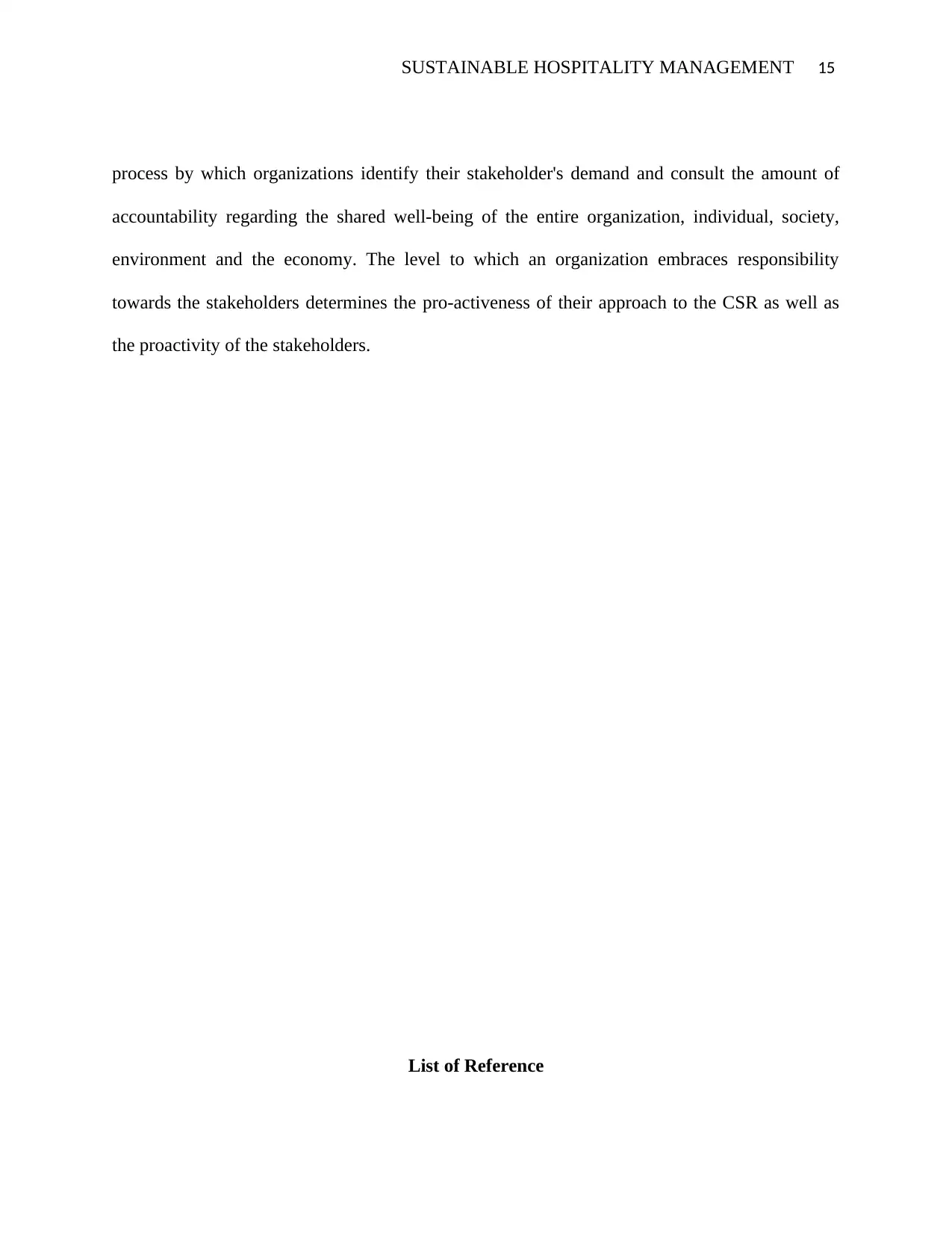
SUSTAINABLE HOSPITALITY MANAGEMENT 15
process by which organizations identify their stakeholder's demand and consult the amount of
accountability regarding the shared well-being of the entire organization, individual, society,
environment and the economy. The level to which an organization embraces responsibility
towards the stakeholders determines the pro-activeness of their approach to the CSR as well as
the proactivity of the stakeholders.
List of Reference
process by which organizations identify their stakeholder's demand and consult the amount of
accountability regarding the shared well-being of the entire organization, individual, society,
environment and the economy. The level to which an organization embraces responsibility
towards the stakeholders determines the pro-activeness of their approach to the CSR as well as
the proactivity of the stakeholders.
List of Reference
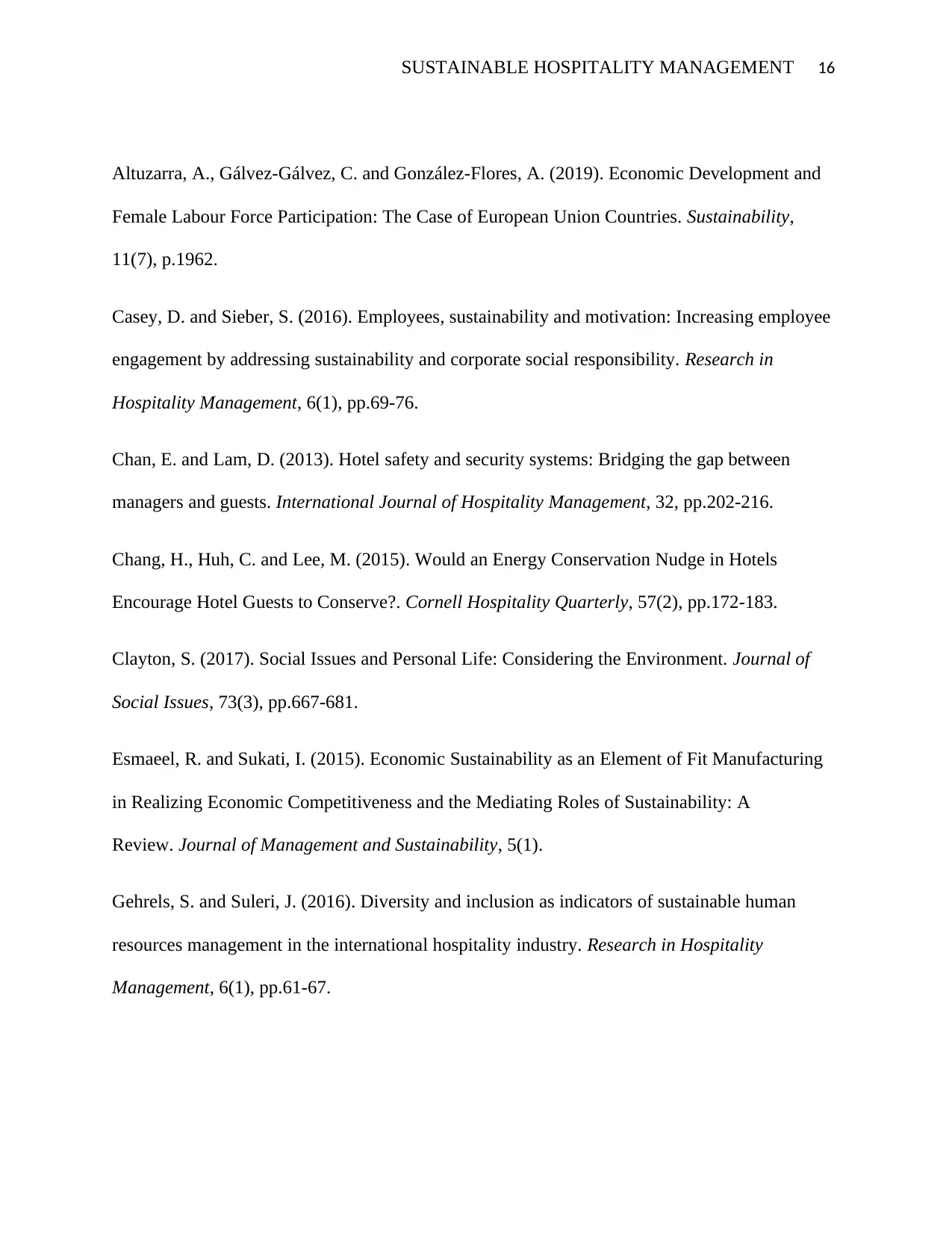
SUSTAINABLE HOSPITALITY MANAGEMENT 16
Altuzarra, A., Gálvez-Gálvez, C. and González-Flores, A. (2019). Economic Development and
Female Labour Force Participation: The Case of European Union Countries. Sustainability,
11(7), p.1962.
Casey, D. and Sieber, S. (2016). Employees, sustainability and motivation: Increasing employee
engagement by addressing sustainability and corporate social responsibility. Research in
Hospitality Management, 6(1), pp.69-76.
Chan, E. and Lam, D. (2013). Hotel safety and security systems: Bridging the gap between
managers and guests. International Journal of Hospitality Management, 32, pp.202-216.
Chang, H., Huh, C. and Lee, M. (2015). Would an Energy Conservation Nudge in Hotels
Encourage Hotel Guests to Conserve?. Cornell Hospitality Quarterly, 57(2), pp.172-183.
Clayton, S. (2017). Social Issues and Personal Life: Considering the Environment. Journal of
Social Issues, 73(3), pp.667-681.
Esmaeel, R. and Sukati, I. (2015). Economic Sustainability as an Element of Fit Manufacturing
in Realizing Economic Competitiveness and the Mediating Roles of Sustainability: A
Review. Journal of Management and Sustainability, 5(1).
Gehrels, S. and Suleri, J. (2016). Diversity and inclusion as indicators of sustainable human
resources management in the international hospitality industry. Research in Hospitality
Management, 6(1), pp.61-67.
Altuzarra, A., Gálvez-Gálvez, C. and González-Flores, A. (2019). Economic Development and
Female Labour Force Participation: The Case of European Union Countries. Sustainability,
11(7), p.1962.
Casey, D. and Sieber, S. (2016). Employees, sustainability and motivation: Increasing employee
engagement by addressing sustainability and corporate social responsibility. Research in
Hospitality Management, 6(1), pp.69-76.
Chan, E. and Lam, D. (2013). Hotel safety and security systems: Bridging the gap between
managers and guests. International Journal of Hospitality Management, 32, pp.202-216.
Chang, H., Huh, C. and Lee, M. (2015). Would an Energy Conservation Nudge in Hotels
Encourage Hotel Guests to Conserve?. Cornell Hospitality Quarterly, 57(2), pp.172-183.
Clayton, S. (2017). Social Issues and Personal Life: Considering the Environment. Journal of
Social Issues, 73(3), pp.667-681.
Esmaeel, R. and Sukati, I. (2015). Economic Sustainability as an Element of Fit Manufacturing
in Realizing Economic Competitiveness and the Mediating Roles of Sustainability: A
Review. Journal of Management and Sustainability, 5(1).
Gehrels, S. and Suleri, J. (2016). Diversity and inclusion as indicators of sustainable human
resources management in the international hospitality industry. Research in Hospitality
Management, 6(1), pp.61-67.
Secure Best Marks with AI Grader
Need help grading? Try our AI Grader for instant feedback on your assignments.
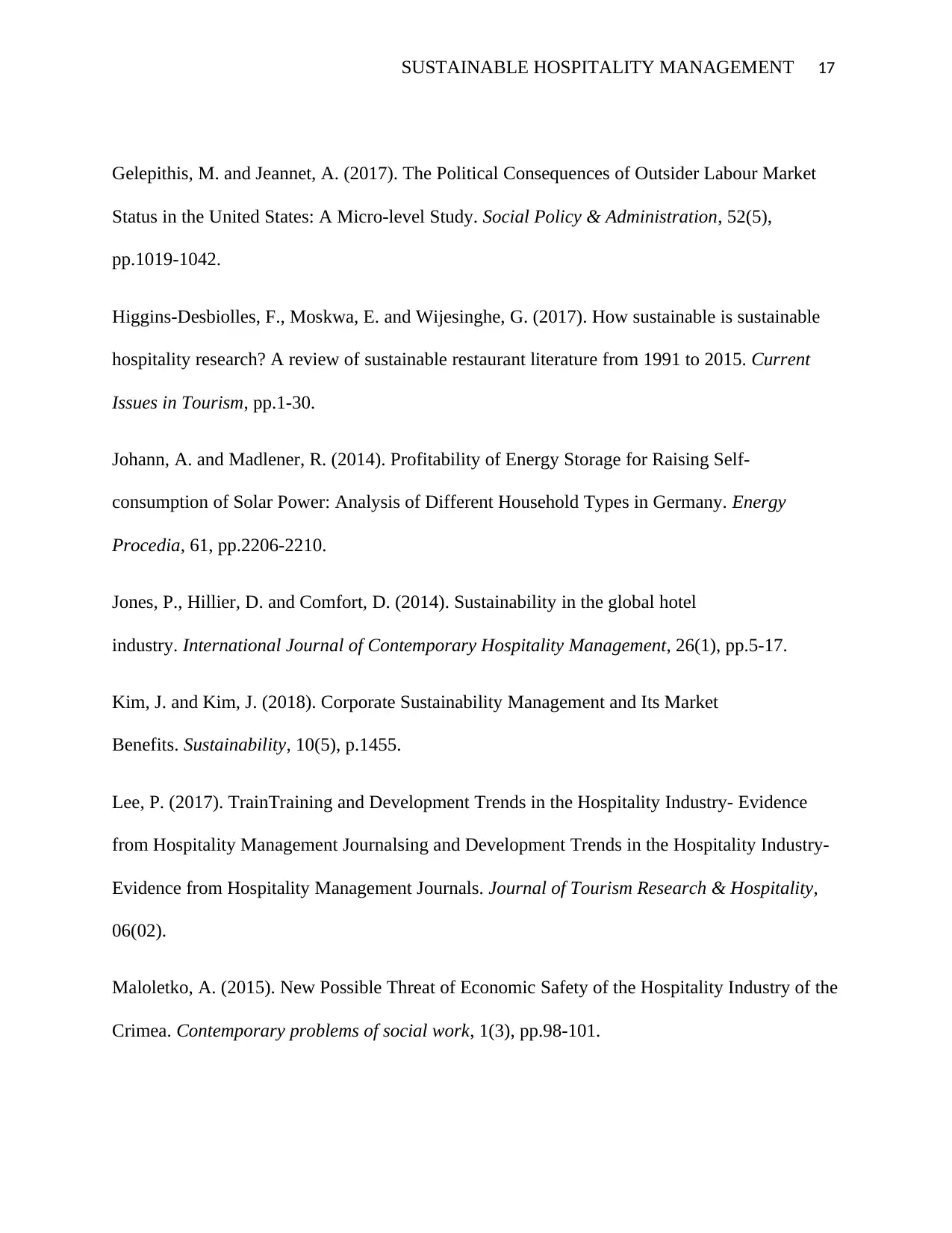
SUSTAINABLE HOSPITALITY MANAGEMENT 17
Gelepithis, M. and Jeannet, A. (2017). The Political Consequences of Outsider Labour Market
Status in the United States: A Micro-level Study. Social Policy & Administration, 52(5),
pp.1019-1042.
Higgins-Desbiolles, F., Moskwa, E. and Wijesinghe, G. (2017). How sustainable is sustainable
hospitality research? A review of sustainable restaurant literature from 1991 to 2015. Current
Issues in Tourism, pp.1-30.
Johann, A. and Madlener, R. (2014). Profitability of Energy Storage for Raising Self-
consumption of Solar Power: Analysis of Different Household Types in Germany. Energy
Procedia, 61, pp.2206-2210.
Jones, P., Hillier, D. and Comfort, D. (2014). Sustainability in the global hotel
industry. International Journal of Contemporary Hospitality Management, 26(1), pp.5-17.
Kim, J. and Kim, J. (2018). Corporate Sustainability Management and Its Market
Benefits. Sustainability, 10(5), p.1455.
Lee, P. (2017). TrainTraining and Development Trends in the Hospitality Industry- Evidence
from Hospitality Management Journalsing and Development Trends in the Hospitality Industry-
Evidence from Hospitality Management Journals. Journal of Tourism Research & Hospitality,
06(02).
Maloletko, A. (2015). New Possible Threat of Economic Safety of the Hospitality Industry of the
Crimea. Contemporary problems of social work, 1(3), pp.98-101.
Gelepithis, M. and Jeannet, A. (2017). The Political Consequences of Outsider Labour Market
Status in the United States: A Micro-level Study. Social Policy & Administration, 52(5),
pp.1019-1042.
Higgins-Desbiolles, F., Moskwa, E. and Wijesinghe, G. (2017). How sustainable is sustainable
hospitality research? A review of sustainable restaurant literature from 1991 to 2015. Current
Issues in Tourism, pp.1-30.
Johann, A. and Madlener, R. (2014). Profitability of Energy Storage for Raising Self-
consumption of Solar Power: Analysis of Different Household Types in Germany. Energy
Procedia, 61, pp.2206-2210.
Jones, P., Hillier, D. and Comfort, D. (2014). Sustainability in the global hotel
industry. International Journal of Contemporary Hospitality Management, 26(1), pp.5-17.
Kim, J. and Kim, J. (2018). Corporate Sustainability Management and Its Market
Benefits. Sustainability, 10(5), p.1455.
Lee, P. (2017). TrainTraining and Development Trends in the Hospitality Industry- Evidence
from Hospitality Management Journalsing and Development Trends in the Hospitality Industry-
Evidence from Hospitality Management Journals. Journal of Tourism Research & Hospitality,
06(02).
Maloletko, A. (2015). New Possible Threat of Economic Safety of the Hospitality Industry of the
Crimea. Contemporary problems of social work, 1(3), pp.98-101.
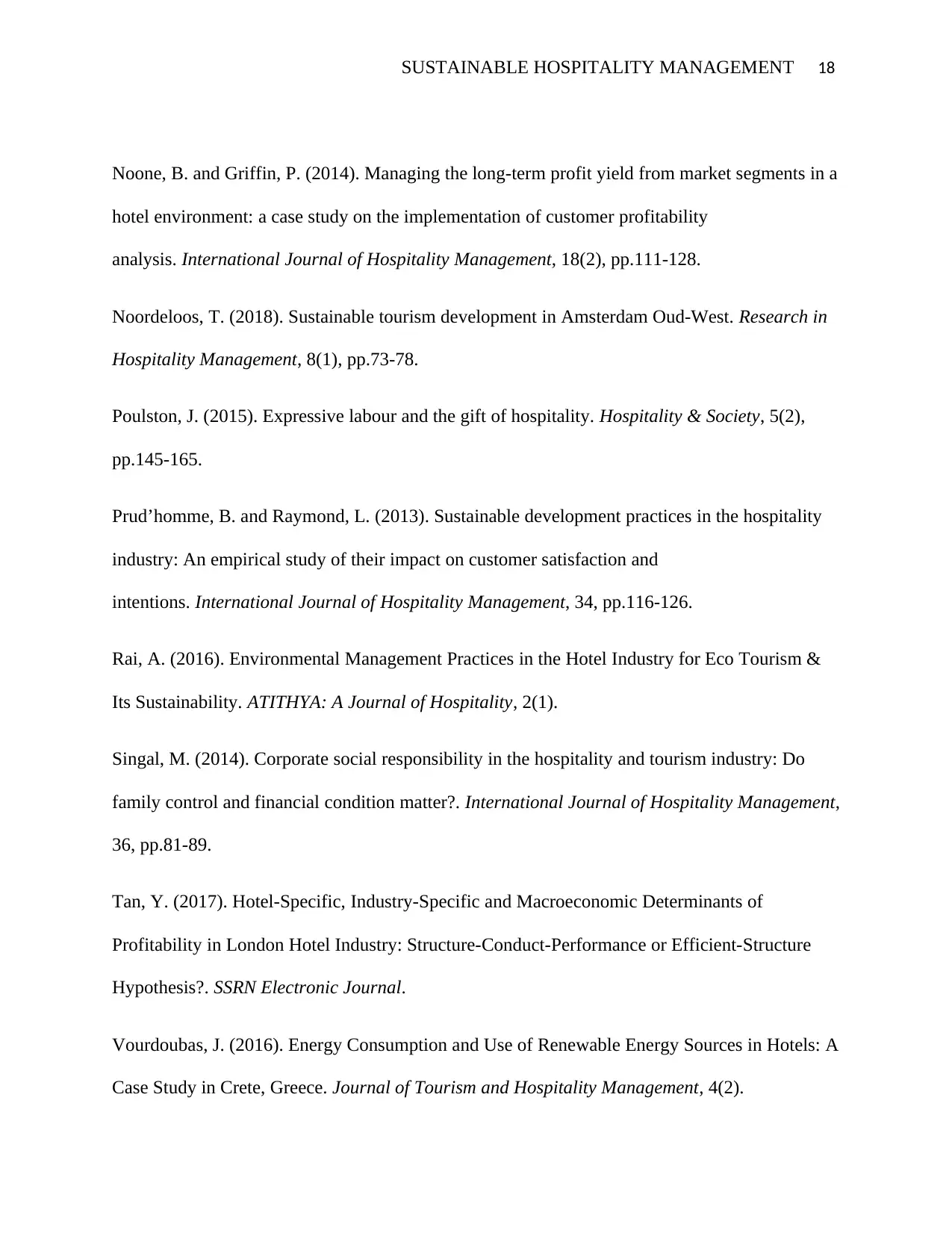
SUSTAINABLE HOSPITALITY MANAGEMENT 18
Noone, B. and Griffin, P. (2014). Managing the long-term profit yield from market segments in a
hotel environment: a case study on the implementation of customer profitability
analysis. International Journal of Hospitality Management, 18(2), pp.111-128.
Noordeloos, T. (2018). Sustainable tourism development in Amsterdam Oud-West. Research in
Hospitality Management, 8(1), pp.73-78.
Poulston, J. (2015). Expressive labour and the gift of hospitality. Hospitality & Society, 5(2),
pp.145-165.
Prud’homme, B. and Raymond, L. (2013). Sustainable development practices in the hospitality
industry: An empirical study of their impact on customer satisfaction and
intentions. International Journal of Hospitality Management, 34, pp.116-126.
Rai, A. (2016). Environmental Management Practices in the Hotel Industry for Eco Tourism &
Its Sustainability. ATITHYA: A Journal of Hospitality, 2(1).
Singal, M. (2014). Corporate social responsibility in the hospitality and tourism industry: Do
family control and financial condition matter?. International Journal of Hospitality Management,
36, pp.81-89.
Tan, Y. (2017). Hotel-Specific, Industry-Specific and Macroeconomic Determinants of
Profitability in London Hotel Industry: Structure-Conduct-Performance or Efficient-Structure
Hypothesis?. SSRN Electronic Journal.
Vourdoubas, J. (2016). Energy Consumption and Use of Renewable Energy Sources in Hotels: A
Case Study in Crete, Greece. Journal of Tourism and Hospitality Management, 4(2).
Noone, B. and Griffin, P. (2014). Managing the long-term profit yield from market segments in a
hotel environment: a case study on the implementation of customer profitability
analysis. International Journal of Hospitality Management, 18(2), pp.111-128.
Noordeloos, T. (2018). Sustainable tourism development in Amsterdam Oud-West. Research in
Hospitality Management, 8(1), pp.73-78.
Poulston, J. (2015). Expressive labour and the gift of hospitality. Hospitality & Society, 5(2),
pp.145-165.
Prud’homme, B. and Raymond, L. (2013). Sustainable development practices in the hospitality
industry: An empirical study of their impact on customer satisfaction and
intentions. International Journal of Hospitality Management, 34, pp.116-126.
Rai, A. (2016). Environmental Management Practices in the Hotel Industry for Eco Tourism &
Its Sustainability. ATITHYA: A Journal of Hospitality, 2(1).
Singal, M. (2014). Corporate social responsibility in the hospitality and tourism industry: Do
family control and financial condition matter?. International Journal of Hospitality Management,
36, pp.81-89.
Tan, Y. (2017). Hotel-Specific, Industry-Specific and Macroeconomic Determinants of
Profitability in London Hotel Industry: Structure-Conduct-Performance or Efficient-Structure
Hypothesis?. SSRN Electronic Journal.
Vourdoubas, J. (2016). Energy Consumption and Use of Renewable Energy Sources in Hotels: A
Case Study in Crete, Greece. Journal of Tourism and Hospitality Management, 4(2).
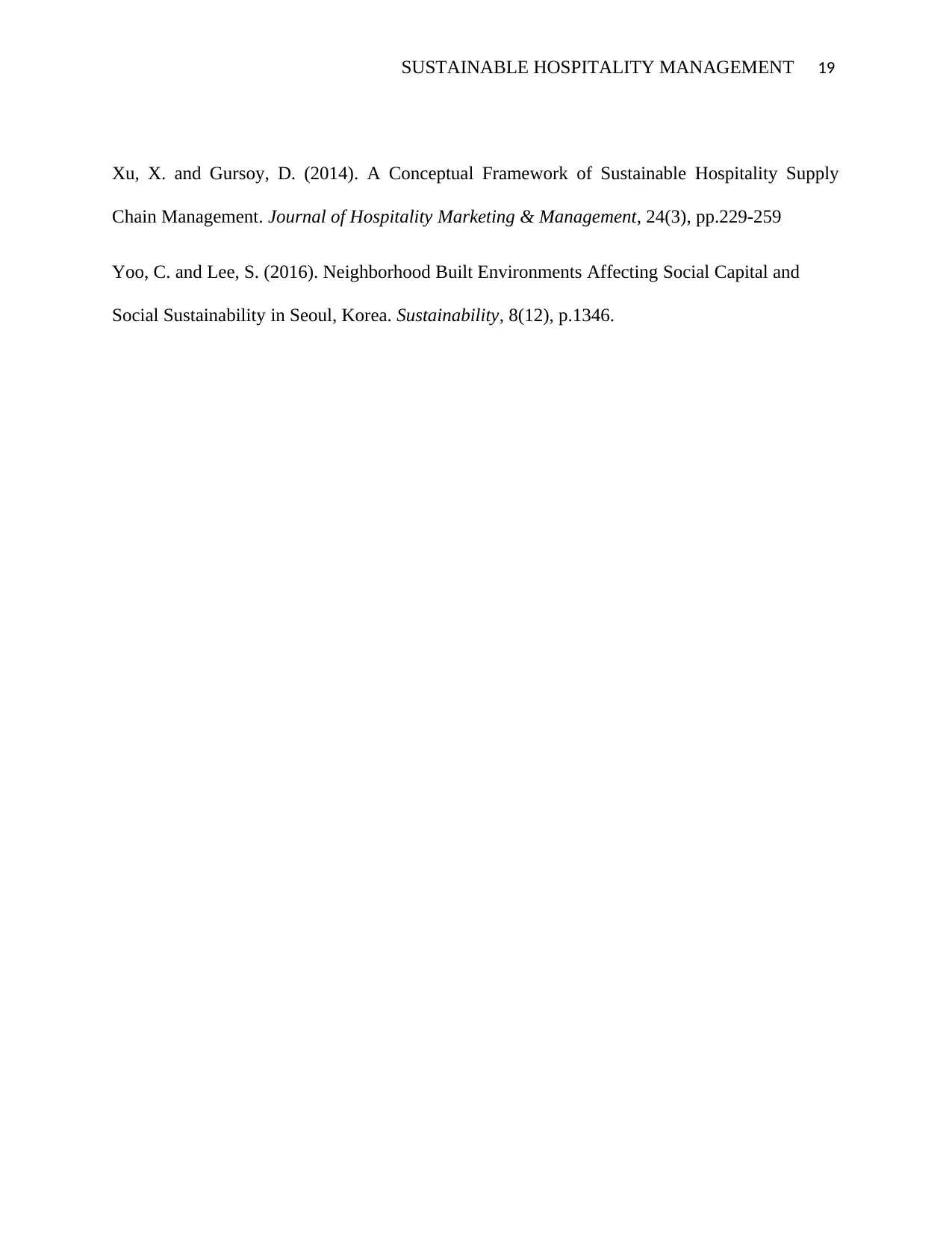
SUSTAINABLE HOSPITALITY MANAGEMENT 19
Xu, X. and Gursoy, D. (2014). A Conceptual Framework of Sustainable Hospitality Supply
Chain Management. Journal of Hospitality Marketing & Management, 24(3), pp.229-259
Yoo, C. and Lee, S. (2016). Neighborhood Built Environments Affecting Social Capital and
Social Sustainability in Seoul, Korea. Sustainability, 8(12), p.1346.
Xu, X. and Gursoy, D. (2014). A Conceptual Framework of Sustainable Hospitality Supply
Chain Management. Journal of Hospitality Marketing & Management, 24(3), pp.229-259
Yoo, C. and Lee, S. (2016). Neighborhood Built Environments Affecting Social Capital and
Social Sustainability in Seoul, Korea. Sustainability, 8(12), p.1346.
1 out of 19
Related Documents
Your All-in-One AI-Powered Toolkit for Academic Success.
+13062052269
info@desklib.com
Available 24*7 on WhatsApp / Email
![[object Object]](/_next/static/media/star-bottom.7253800d.svg)
Unlock your academic potential
© 2024 | Zucol Services PVT LTD | All rights reserved.




